REMEMBERING DR. S. VASUDEVAN
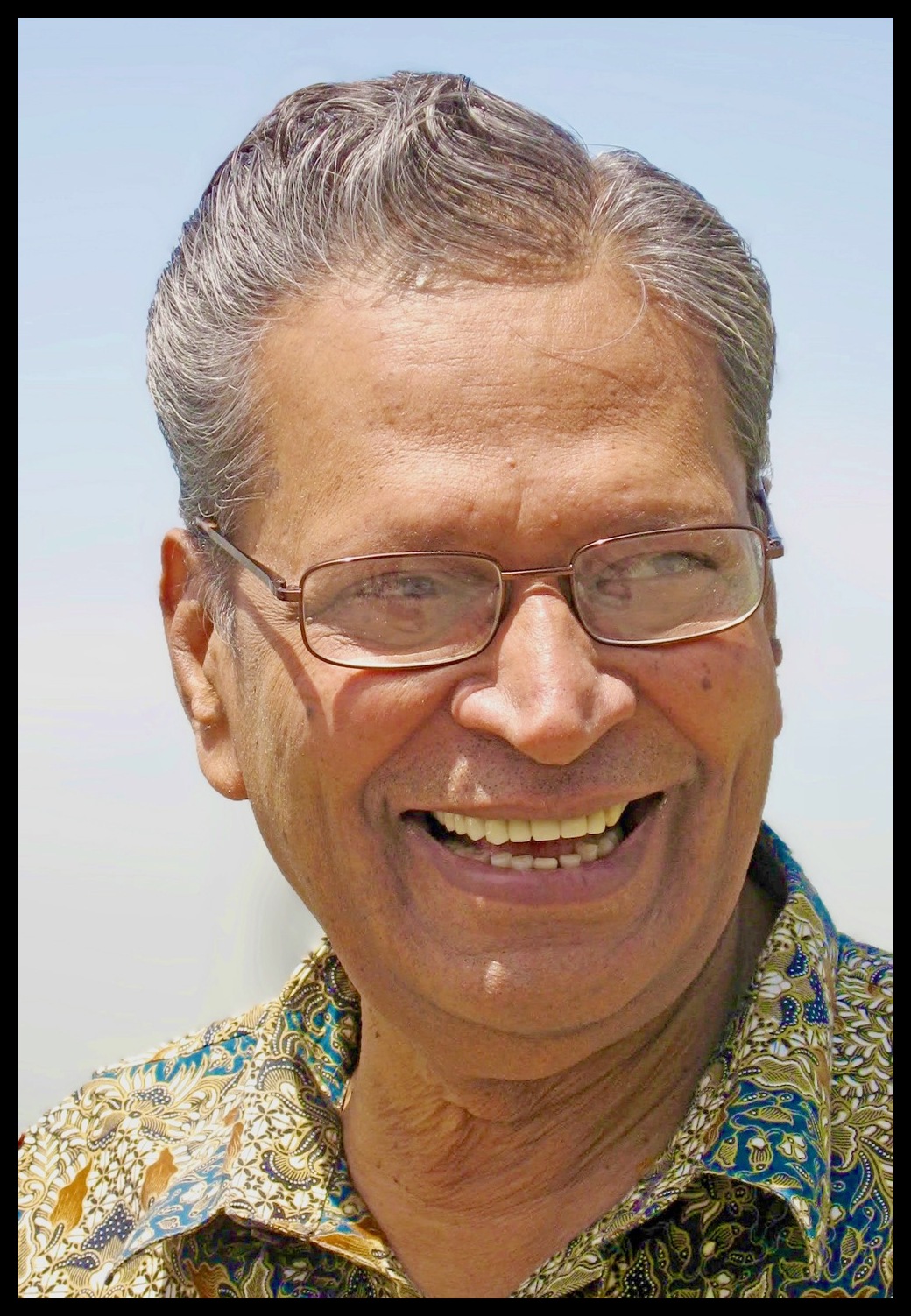
4 May 1938 to 25 June 2024
Dr. Vasudevan Sankaran Nair who has touched the lives of multitudes of people across the globe was indeed a God-intoxicated servant of Bahá’u’lláh, occupying a unique and peerless place in our history. His sixty-four years of constant and relentless service cannot be contained in these few pages. Suffice to say that his services and legacy shall everlastingly endure and shine in the memory of history.
Vasudevan was affectionately called Vasu by friends. During the British rule of Malaya, his parents had migrated from South India into Malaya which was later to become Malaysia. His father, is the late Mr. Attasseri Sankaran Nair while his mother is the late Madam Cherukad Meenakshi Amma. Kamala, the eldest daughter in the family and Vasu were among the ten siblings to be born abroad. Kamala who was left under the care of her relatives passed away a few months after she was born. Vasu was born in Vellore District of Tamil Nadu when his mother went to visit her brother there. As a child, Vasu was brought back into Malaya and brought up among other siblings in the Diamond Jubilee Estate in the Jasin District of Malacca state.
Vasu started his schooling in the Tamil Elementary School in the Diamond Jubilee Estate till 1947 when he completed his elementary five. He then stayed with his relatives running the Kesary Restaurant in the Brickfields area in Kuala Lumpur and continued his secondary education at the Kishan Dial Private Secondary School near Brickfields. It was located just behind the now defunct Lido cinema hall and possibly the first private school in the country to prepare students for the Overseas Senior Cambridge School Certificate. One of his teachers was the late Tan Sri Devaki Krishnan, a well-remembered social worker and politician. As she was becoming more and more involved in political activities, she absented herself from school, and Vasu, as a senior and bright student stepped into her shoes to take over her classes.
Upon passing his School Certificate Examinations in 1957 at the Kishan Dial Private School, Vasu went to teach temporarily in the Methodist English School, Telok Datok, Banting. From 1958 to 1959 he was in England to pursue his teacher training at the renowned Brinsford Lodge to become a teacher in secondary schools. At the end of 1959, Vasu returned to Malacca ,and in January 1960 he was posted to serve at St. David’s High School, Malacca where he taught till 1965. His England days had built new talents in Vasu. He proved to be a good violinist and pianist playing classic English songs as well as old Tamil songs. He was an excellent singer as well. At St. David’s High School, he proved to be a good sportsman and a sports teacher as well, leading the school football team to victory in several matches. Vasu was also a very good cook. Vasu became well conversant in the Tamil and English classic literature. All these talents had their right place in his life, especially after accepting the Bahá’í Faith.
ACCEPTING THE FAITH
It was through dramatic circumstances that Vasu accepted the Bahá’í Faith. His elder brother S. Bhaskaran had already accepted the Faith in 1959 but did not disclose it to Vasu when he returned home. Bhaskaran took Vasu to meet a police officer by the name of Mr. Eustace Anthony Fernandez (Tony Fernandez), and his wife Beatrice Philomena Monteiro (Betty) at their police quarters in Ujong Pasir with the hope of exposing him to the Faith. There Vasu saw a banner on the wall with the following words, “Bahá’í – the Union of all Peoples in one Universal Cause, one Common Faith”. The words greatly impressed him. From that house of Tony, they all went over to visit Mr. Leong Tat Chee at his home, which was also the Bahá’í Centre of Malacca town. There, Vasu witnessed a pleasant group of Indian and Chinese youths in joyful and radiant fellowship, a new kind of atmosphere he had never witnessed elsewhere before. There too Vasu saw the same banner that he had seen in the home of Tony. Vasu spontaneously asked Tony, “What is Bahá’í?” Tony turned to Leong Tat Chee and said, “Uncle Leong, please give it to him. He has asked for it!” Leong Tat Chee briefly mentioned the Faith which was Vasu’s first introduction to the Faith. Vasu was next taken to a fireside at the home of Mr. Saurajen, the first believer of Malacca town where he met more Bahá’ís. Following that he was taken for a talk at the Sea View Hotel in Klebang Kecil where Dr. John Fozdar, a Knight of Bahá’u’lláh to Brunei, who was on his way to Sarawak from his advanced medical studies in the United Kingdom spoke on the Faith. In stages Vasu was given the Faith in greater measures, but he being an intelligent and intellectual seeker, was still sceptical and asked many intellectual questions.
It happened that Vasu shared a house with some school teachers on the same road as the Bahá’í Centre in Malacca town. So, it was natural for Vasu to meet Bahá’ís and learn more about the Faith. But it was Leong Tat Chee who persistently gave him the message. After school hours, Leong Tat Chee used to wait for Vasu in his car just outside the school where Vasu was teaching to follow up with him. Vasu tried avoiding Leong Tat Chee but in vain. Vasu was given many books to read. Then came the opportune moment. When Vasu read the first four chapters of the book called ‘Science, Mysticism, and Revelation’ by Glenn A. Shook, his doubts were completely cleared and in his own words, “my spiritual eyes were opened”. Although Vasu was ready to accept the Faith, he was quite reluctant to openly express his wish, as he had all along been asking many difficult questions. This was the time when Tony Fernandez had just been promoted to Assistant Superintendent of Police. Bhaskaran took Vasu to the police quarters of Tony Fernandez to congratulate Tony. From there the three walked over to the residence of Leong Tat Chee. Tony then turned to Vasu and asked him, “When are you going to accept the Faith man? You are the most difficult enquirer we have had.” Vasu replied, “I am ready right now.” But Tony informed Vasu it would be very memorable if he could accept the Faith during the next meeting of the Local Spiritual Assembly when Hand of the Cause of God Dr. Raḥmatu’lláh Muhájir would be present. And so Vasu accepted the Faith in the Malacca Bahá’í Centre during the meeting of the Local Spiritual Assembly of Malacca when Dr. Muhájir was present. That was on 9 August 1960, nine months after Vasu began a serious investigation of the Faith. As soon as Vasu accepted the Faith, Dr. Muhájir shook hands with him and showed his profound happiness by presenting him with an attar of rose that he had brought with him from the Holy Land. That was the sweet beginning of Vasu’s spiritual life from which there was no turning back. That very day cemented an unexplained bond that united Vasu with Dr. Muhájir.
All along Vasu was commuting from the Diamond Jubilee Estate in Jasin district to his St. David’s High School in Malacca town. In 1960 Vasu rented a house at 4750-C, Jalan Penghulu Abbas, Bukit Baru, Malacca, and brought all his family members from that estate into this house. Bhaskaran and Vasu then brought all their family members into the Faith in stages. His mother accepted the Faith in 1961 and the father in 1971. Both his parents served on the first Local Spiritual Assembly of Bukit Baru in 1971.
HEAVY RESPONSIBILITIES
Vibrating with the newly found Faith, Vasu saw a meteoric rise in serving in a vast number of activities with such a driving force yet to be witnessed among his peers in his days. Having understood the essence of the mission of Bahá’u’lláh, Vasu arose to energetically and assiduously serve the Cause till his very last days. In the early days of the Faith in Malaya when the Ten-Year Crusade was still in force, it was in Malacca where most of the large scale activities were held for the whole of Malaya. Until his departure from Malaysia to India as a pioneer in 1967, Vasu was appointed into several important committees that needed full commitment and dedication. In the very year of his acceptance of the Faith Vasu was appointed into the Pan-Malayan Teaching Conference Committee with its base in Malacca. This committee organised large scale conferences. In 1961 Vasu was elected to the Local Spiritual Assembly of Malacca town and was continuously elected till the year 1965.
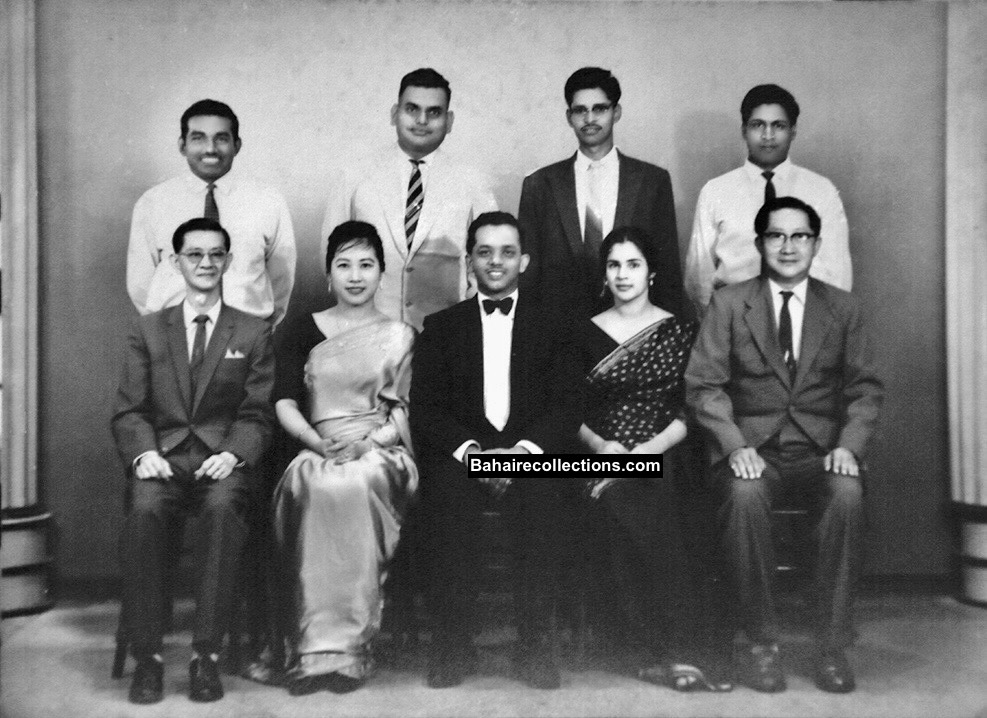
Local Spiritual Assembly of 1961. Seated (L-R) Chin Soon Boon, Lily Chinniah, E. A. Fernandez, Betty Fernandez, Leong Tat Chee. Standing (L-R) Raymond Peter, Nagalingam, S. Vasudevan, and Kumara Das.
In the same year of 1961, Vasu was on the Youth Committee and was also on the first Translation Committee to assist in the translation of Bahá’í materials into the Tamil language, starting with the translation of some Bahá’í prayers and the Marriage Tablet of ‘Abdu’l-Bahá in the Tamil language. He was also appointed to the ‘Watch Committee’ of the Local Spiritual Assembly to assist in gathering Bahá’ís who had not been coming for activities for a long time. Vasu headed the sub-committee for Sports as well. In 1963, Vasu became Chairman of the Sub-Committee for Youth under the National Teaching Committee of Malaya. In 1963 Vasu was also on the Sub-Committee of the National Teaching Committee for Consolidation. In 1963 the second National Bahá’í Youth Council of Malaya was formed with Vasu as the Chairman. He is well remembered for playing a key and leading role in keeping the youths actively involved in Bahá’í activities. After the election of the first National Spiritual Assembly in 1964, a National Teaching Committee was formed for Peninsula Malaysia with Vasu as a member. In 1965 he was elected to the National Spiritual Assembly and was its Secretary, a responsibility he held till 1966. From 1965 to 1966 Vasu served as the Secretary of the National Teaching Committee.
Vasu also started off his services as an active field worker, taking the Cause to places across the country. As early as 1961 he, along with other believers of Malacca undertook several teaching trips to Muar town which was then a difficult goal area. In 1963 he went for teaching and consolidation work to the East Coast, at a time when many were reluctant to go to this part of the country owing to very long distance and poor roads. As soon as the Summer School was over in December 1962, he gathered a few friends and went visiting believers in the northern part of the country covering Alor Setar, Penang and Taiping.
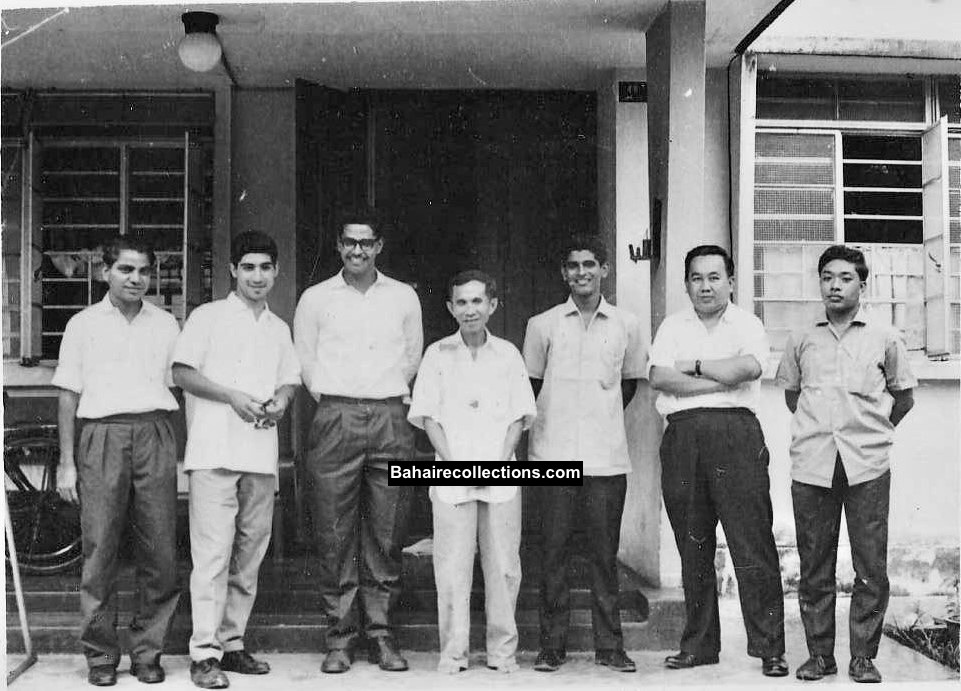
Dropping into Penang during the trip to North Malaya in December 1962. Abolfazl Bijan Bayzaee is second from left, and Vasu third from left. Isaac DCruz is third from right and Alan Tan at the extreme right. Standing between Isaac DCruz and Alan Tan is Chong Kia Toon.
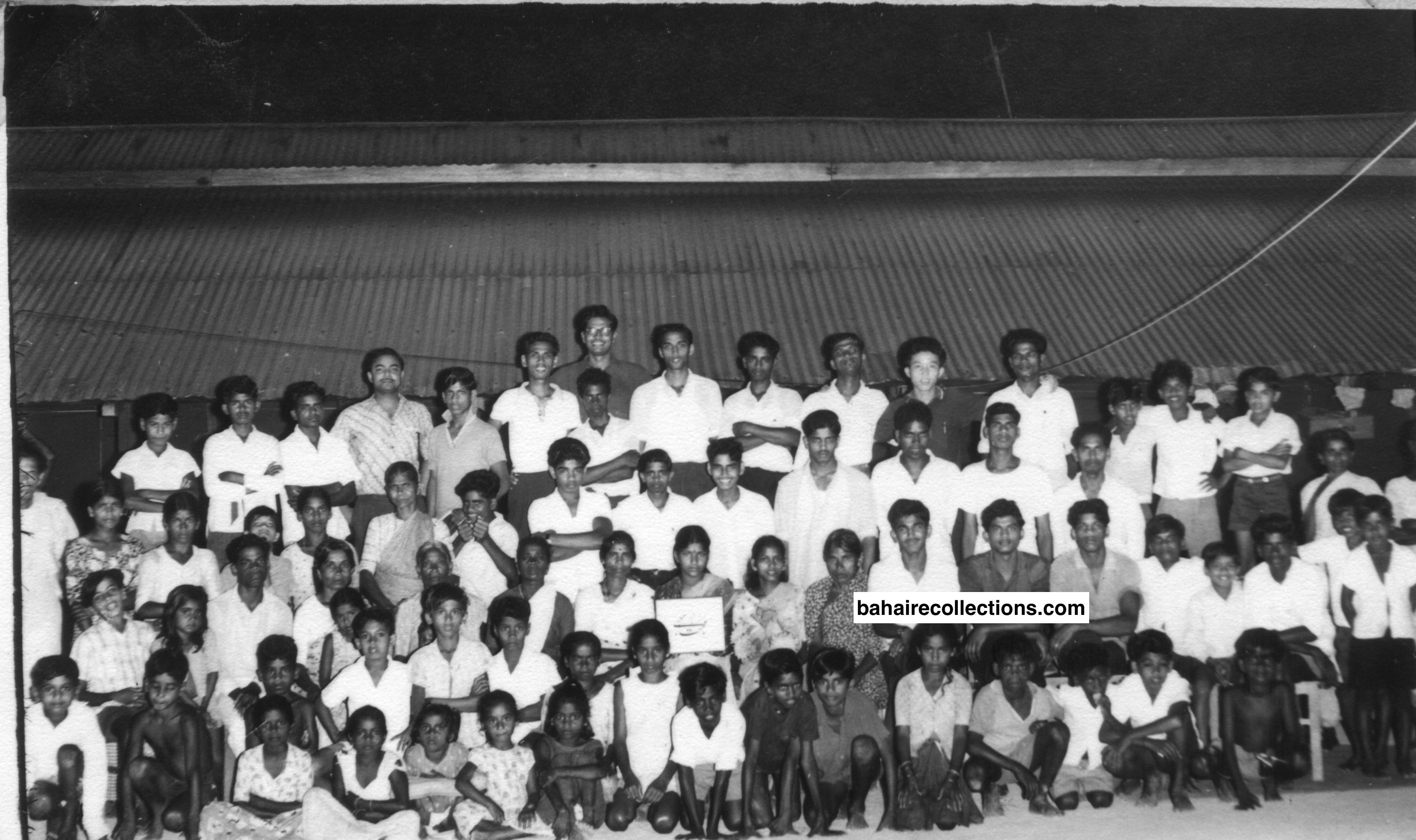
Gathering in Serkam Estate, Malacca in 1963. Vasu stands tallest at back row.
A DYNAMIC SPEAKER
During the early days of the development of the Faith vibrant speakers were needed to move the hearts. Vasu, given his acumen for research as an avid reader became one of the most sought speaker as he was able to deliver his talks with such a clarity, in-depth research and penetrative deliverance. Listed here are some of the most memorable talks remembered by the early believers. When the first Pan- Malayan Youth Conference was held in Seremban town in December 1961, it was Vasu who was tasked with reading the moving message from the Hands of the Faith in the Holy Land, which stressed on the need to fulfil the tasks set out in the Ten-Year Crusade.
At a Regional Youth Conference held in Seremban in 1963, he spoke with clarity on “The Charter of the New World Order”. As the First Bahá’í World Congress was going on in London, the Bahá’ís of Seremban organised the centennial celebrations locally. A Grand Tea Party was held at the Seremban Town Hall on 1 May 1963, where the guest speaker was Vasu who presented a comprehensive outline of the Faith. On 10 November 1963, a State Teaching Conference was held in Seremban town where Vasu spoke with great dynamism on “Divine Guide for Civilisation”. At the first National Convention of Malaysia held in Riḍván 1964 in Kuala Lumpur, Vasu delivered a moving talk on “Bahá’í Youth, Servants of the Cause”. That talk became one of the highlights of the Convention. A grand public talk on the Faith was arranged in the Seremban Town Hall in 1966 at full capacity where Vasu was the Bahá’í speaker while Mr. Gurnam Singh Gill, the President of the Seremban Municipality presided at the function. On 26 November 1966, the Local Spiritual Assembly of Seremban town was invited by the Malaysian Babaji Yoga Sangam to present the Bahá’í Faith at the Parliament of World Religions. This society had been formed to promote inter-religious unity and spiritual, as well as material peace. Here Vasu spoke brilliantly on the Bahá’í Faith in the Tamil language, where more than 100 people participated. Throughout his stay in Malaysia, Vasu was also a fluent speaker at several firesides held in the Tamil and English languages.
BROUGHT JOY AT GATHERINGS
Serious as he was, Vasu also had a high sense of humour unmatched by others. He had a rare talent of cheering all in any crowd, and friends flocked to him to be cheered and gladdened by his witty jokes. His jokes were never at the expense of his fellow humans. Old timers would remember his “Alfonso Flea” joke taken from an old Charlie Chaplin movie Limelight. He had the art of imitating people, without hurting their feelings. At all gatherings he was a live wire, bringing joy, laughter and vibrancy. One would recall the cultural performance presented by some youths at the first National Convention graced by Amatu’l-Bahá Rúhíyyih Khánum. Vasu and a few youths disguised themselves as girls and performed the high-energy and physically demanding ‘can-can’ dance. Amatu’l-Bahá laughed heartily. On the evening of the second day of the Convention the youth put on a show called ‘Everyone Becomes a Bahá’í’ and the highlight was Vasu singing the ‘Ballad of Yankee’ to an old Tamil song tune, while S. Satanam, a believer from Seremban echoed it. Yankee Leong is the first believer of Peninsula Malaya. As per the request of Amatu’l-Bahá, the cultural program on the second night was repeated on the third night as well. Amatu’l-Bahá enjoyed the program that she encouragingly remarked that she would love to return to Malaya whenever such entertainment was held!
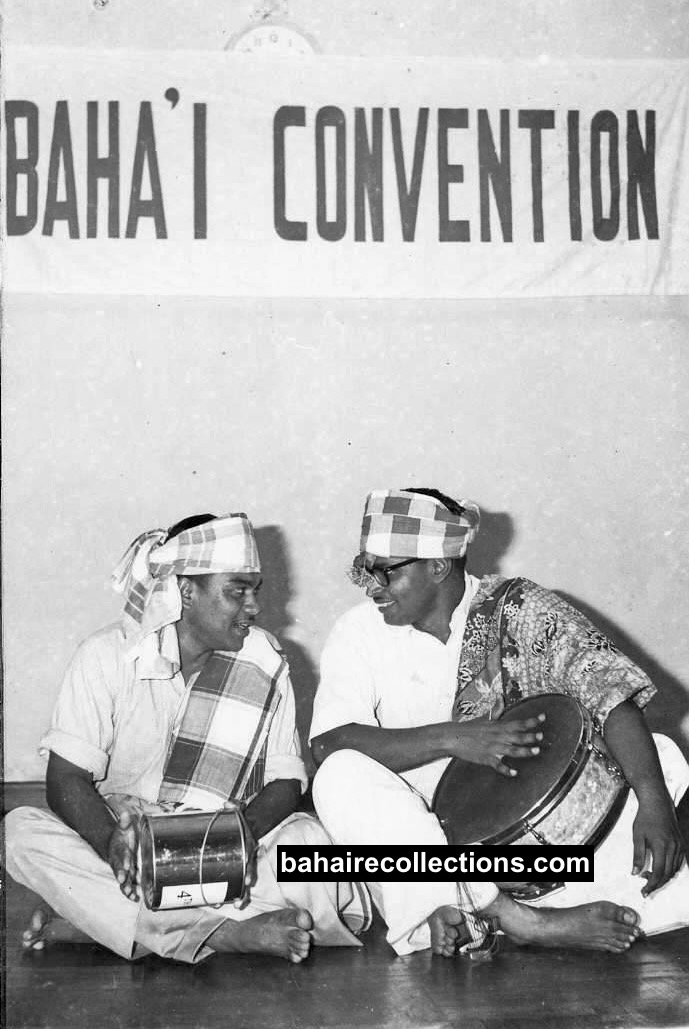
Vasu (right) sings ‘The Ballad of Yankee’ to an old Tamil song tune, while S. Satanam (left) echoes it.
ON THE NATIONAL INSTITUTION
Since getting elected to the National Spiritual Assembly of Malaysia in 1965 and becoming its Secretary he worked on systematizing the work of the National Spiritual Assembly. Dr. Chellie John Sundram, a close friend of Vasu and Chairman of the national institution assisted Vasu in preparing systematized minutes. Later Malaysia won praise from the Universal House of Justice for the excellence in which the minutes were presented. Mr. Inparaju Chinniah, popularly called Inbum Chinniah, Treasurer of the national institution got Vasu a good Facit brand typewriter and a duplicating machine. When Vasu was elected to the national institution in 1965 he was still operating from his home in Malacca as he was still teaching there. The room where Vasu operated at his home in Malacca was given the name “The Bahá’í Room”, as it stored boxes of books for distribution. Their dining table held a Gestetner cyclostyling machine on the days when Vasu was busy printing and sending out Bahá’í newsletters and circulars. He would send out circulars all over the country from his house, and at times from the National Bahá’í Teaching Institute in the nearby Bukit Baru area. His house was a hive of activities as a constant stream of visitors created endless work for his mother who gladly and tirelessly served them refreshments.
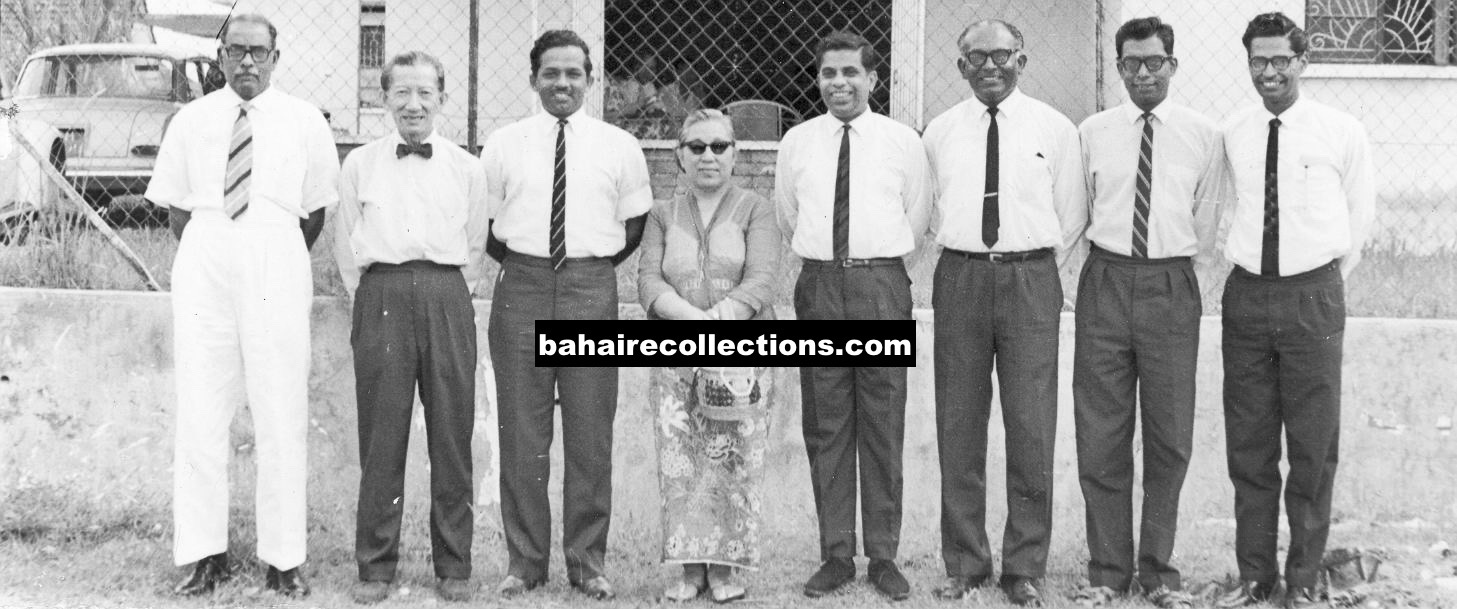
The National Spiritual Assembly elected in Riḍván 1965. L-R: K. Rajah, Yankee Leong, Tony Fernandez, Mrs. George Lee, Dr. Chellie J. Sundram, Appu Raman, Inbum Chinniah and Vasudevan. (Missing in the photo is Dr. John Fozdar)
MOVED TO KUALA LUMPUR
Since operating as secretary of the national institution from Malacca was quite taxing and posing difficulties Vasu found it necessary to move to Kuala Lumpur to discharge his work more effectively. He applied for a transfer which was approved, and in December 1965 he moved as a teacher to the Setapak High School in Kuala Lumpur. The Bahá’ís of Malacca threw a large farewell party for him, naturally with mixed feelings. When Vasu moved into Kuala Lumpur he stayed at the National Bahá’í Centre at 32, Jalan Angsana which was a bungalow house purchased in 1964. Before the coming of Vasu, nobody had stayed at the this building and was maintained by Mr. Wong Kok Mee, an elder believer. When Vasu moved in, there were only two mats with no bedsheets. Mr. Errol Seow Hoon Hin who accepted the Faith in Malacca in 1958 was already in Kuala Lumpur by now. Vasu invited him to stay with him for some time. The first thing these two did was to get some basic beddings and furniture for the Centre. They were yet very happy with the simple accommodation. The coming of Vasu to Kuala Lumpur had several other advantages for both the Kuala Lumpur community and the believers of the whole country. All along this National Bahá’í Centre was kept open only on weekends or on days when activities were on. With the coming of Vasu, the Bahá’í Centre was kept open daily. That the National Bahá’í Centre was kept open daily was publicized, and the Bahá’ís from different corners of the country started frequenting the Centre for the first time. National, regional, and local activities which came to be held in this building increased by leaps and bounds. Vasu himself became a rallying point for the believers in Kuala Lumpur and those from outstation. There was a new spirit and environment in the National Bahá’í Centre.
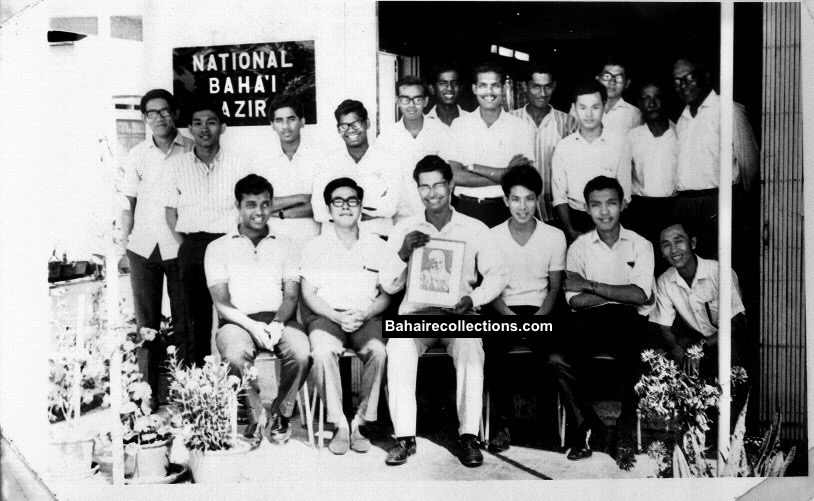
Bahá’í youth from Kuala Lumpur Technical College and Petaling Jaya at the National Bahá’í Centre, 1967. Holding the photo of the Master is S. Vasudevan. Maniam is seated at extreme left. Choo Yeoke Boon is seated at extreme right. Appu Raman stands at extreme right, with Lim Kok Hoon (third from right), S. Sukumaran (fifth from right) Joseph Swaminathan (sixth from right), Kuppusamy (seventh from right), V. Theenathayalu (eighth from right) A.P Arumugam, (ninth from right).
As Secretary of the National Spiritual Assembly, Vasu had to attend to several communities on several teething problems. His proficiency in both the English and Tamil languages enabled him to create inroads into both urban and rural communities, not ruling out the Aboriginal villages as well. In August 1965 he conducted the first Bahai wedding in Sungei Petani town with his excellent Tamil language. His language itself was admired, along with the wide-scale publicity the wedding brought. Vasu worked very hard to send out a series of communications to institutions and individuals across the country. His letters were very uplifting, using moving terminologies. In 1966, Vasu managed to get some circulars and excerpts from the Holy Writings typed and sent out in the Tamil language to reach out to the Tamil speaking believers as well.
As Secretary of the National Institution, Vasu had to serve on several frontiers, always exerting all his time and energy, keeping the Faith uppermost in his mind, and with almost no leisure time for himself. One of the goals of the Supreme Body for Malaysia under the Nine-Year Plan (1964 to 1973) was the erection of a Bahá’í Teaching Institute for which work had started in Bukit Baru in Malacca in 1964. Vasu as Secretary of the national institution saw to the speedy development and completion of this edifice. The Institute was officially opened on 2 January 1966 and became the first of its kind in the entire South East Asian region. Vasu was one of those who was made responsible for organizing weekend courses for Tamil-speaking friends at the Institute, followed by courses for English-speaking friends.
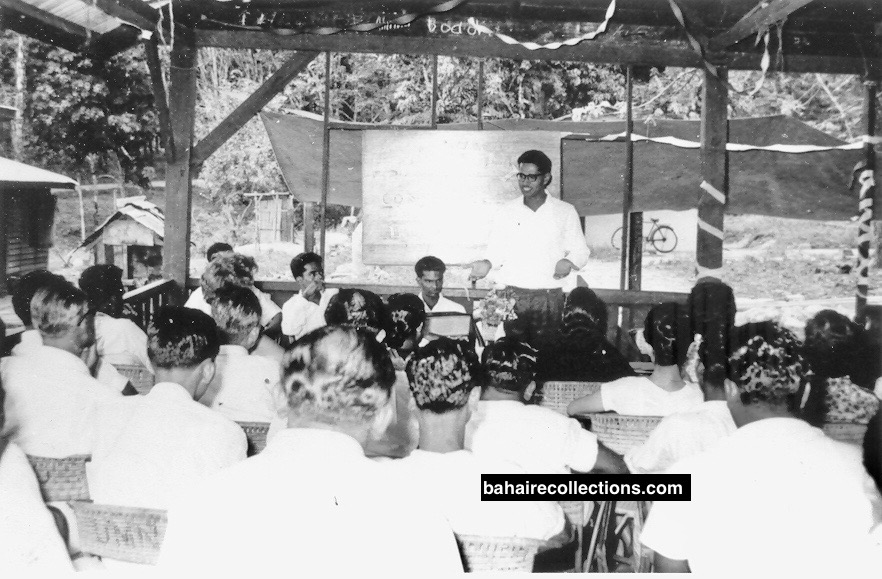
Vasu speaks at a conference for the Orissa people held in Ulu Pedas, 1966.
In June 1965 the Malaysian Bahá’í News magazine was launched as the second official newsletter of the National Spiritual Assembly of the Bahá’ís of Malaysia following the first newsletter called “Berita Bahá’í”. Vasu was one of the members of the editorial board of the Malaysian Bahá’í News magazine, with Mrs. Shantha Sundram serving as its chief editor.
The period from 1967 to 1973 was proclaimed as the period of intense proclamation in Malaysia. At the Fourth National Convention held in 1967, which was the last convention for Vasu in Malaysia, he gave a well-researched and clear explanation on the parameters, scope, and meaning of the proclamation, which was well received and appreciated by those present.
FIRST PIONEER TO INDIA
Little did Vasu realise that he would be uprooted so soon from Kuala Lumpur to Sri Lanka and then into India. Right from the time Vasu accepted the Faith in 1960, Hand of the Cause Dr. Muhájir who had been observing his dynamism and resourcefulness had a tremendous liking for him. Vasu was totally obedient to Dr. Muhájir in every way since Vasu considered Dr. Muhájir as the prime mover of his own heart.
Barely three months had passed since Vasu started to operate under the roof of the National Bahá’í Centre when Dr. Muhájir, in a bolt out of the blue, arrived on the eve of Naw-Rúz 1967 and proposed plans to uproot him to Sri Lanka, where urgent manpower was needed. Vasu immediately consented and informed the Hand that he had to give notice to the school where he was teaching. The next day – Naw-Rúz day, Dr. Muhájir came to the National Bahá’í Centre, sat with Vasu in a room and recited the Tablet of Ahmad. He then announced the appointment of Vasu as an Auxiliary Board member for Sri Lanka – even while Vasu was still in Malaysia. Dr. Muhájir left that evening.
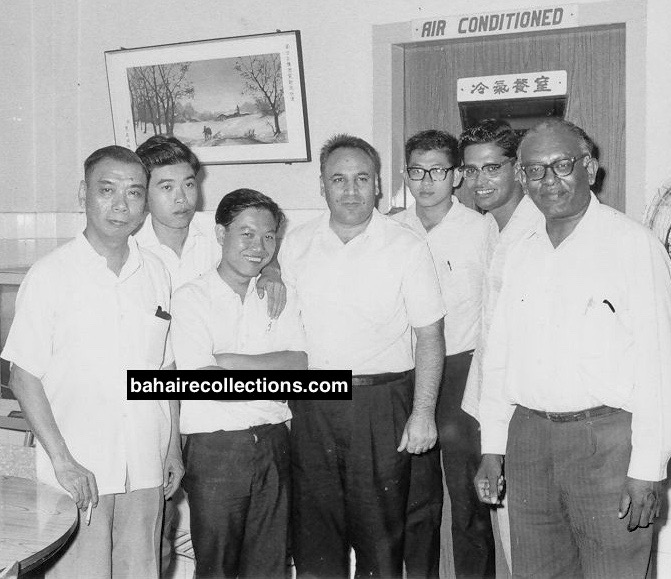
Lunch on Naw-Rúz, 1967 in Kuala Lumpur. (L-R) Wong Kok Mee, Lee Wai Kok, Kit Yin Kiang, Dr. Muhajir, Lim Kok Hoon, S. Vasudevan, and Appu Raman.
Vasu immediately applied to give up his teaching job at the Setapak High School, but he was not released. In May 1967, Dr. Muhájir made another visit to Malaysia and saw that Vasu had not left for Sri Lanka. When Dr. Muhájir was told that the school had not yet released Vasu, Dr. Muhájir himself went to the school that Saturday – a day when the school was usually closed. But on this particular Saturday the headmaster, Mr. Rajendran was present. When Dr. Muhájir requested the headmaster to release Vasu, the headmaster said, “I would like to help him but there are rules. He is needed here.” Dr. Muhájir then told the headmaster, “You know the rules, as well as the exceptions.” The headmaster replied, “He can be released on compassionate or health grounds.” Dr. Muhájir said, “He is exhausted and needs to be released.” Dr. Muhájir and Rajendran conversed for some time. Finally, Rajendran, who was very impressed with Dr. Muhájir and the way he appealed to him, consented to release Vasu. With that Vasu resigned from his job. With that resignation, Vasu was acutely aware that he would be losing all his perks. Yet with a heart overflowing with love for Dr. Muhájir and the Bahá’í Faith, he submitted himself completely to the Hands of Bahá’u’lláh.
Since Vasu was preparing to leave as a pioneer, he was not elected to the National Spiritual Assembly in Riḍván 1967. As a mark of respect, he met the National Spiritual Assembly on the eve of his departure to Sri Lanka. As he came out of the room, Mrs. George Lee, a member of the national institution and a philanthropist living in Singapore followed him and slipped an envelope into his pocket with an expression of intense emotions on her face. Later Vasu saw that the envelope contained a large amount of money. Vasu then went to see his parents in Malacca for their blessings, and the following day returned to Kuala Lumpur. In the early morning of 16 May 1967, Vasu flew to Sri Lanka in the company of Dr. Muhájir. Vasu left the shores of Malaysia, after an intensive period of dynamic and compact activities and a matchless legacy. Vasu had created so many inroads for the growth and development of the Faith, though he was reluctant to seek credit, owing to his utter and genuine humility. It was at age 29, in the prime of youth, as a bachelor that Vasu rose to pioneer. With that, a new phase of unparalleled service opened in his life and his pioneering country. Five days after landing in Sri Lanka, Dr. Muhájir changed his plans and took Vasu to Madras, now Chennai city in Tamil Nadu, India. South India, a vast region with a huge population too needed much manpower at that time. With the English and Tamil fluency of Vasu, Dr. Muhájir felt he would be a great asset there. He was thus the first Malaysian pioneer to India.
As Vasu was vacating the National Bahá’í Centre, Mr. Thinathayallam, a new believer working in the Malaysian Air Force met Vasu at the National Bahá’í Centre and said to him, “You have just become a teacher, which is a prestigious career. You have a long way to go and have a duty to look after your parents and family. Why not you go pioneering at a later time when you are more settled?” Vasu gave a candid reply, “When a Hand of the Cause says go pioneering, you just go.”
A NEW BEGINNING
When Vasu arrived in South India, he observed there were pockets of believers clustered around Bangalore, Mysore, Secunderabad, Cochin, Ooty, Belgaum and Karaikal. The Bahá’ís of Madras city especially was a struggling community. There were two needs- deepening in the essentials of the Faith, and establishing a structure of Bahá’í administration. Vasu’s first posting as pioneer was to the Teaching Institute in Mysore city in Karnataka state. That was a spiritually exhilarating experience for him. For a period of two and a half months he conducted week-end institute courses for school teachers and headmasters of villages where Bahá’ís lived. His week days were spent in visiting these communities in their villages. Beyond Mysore, there was the devoted group of Bahá’ís in Bangalore city, nurtured by Mr. Soroosh Yaganagi and his family. It was this Tuba Palace of the Yaganagi family that Vasu used as his base most of the time when he first arrived in South India.
In September 1967, all of a sudden Vasu was called to New Delhi when preparations were going on in full swing for the Inter-Continental Conference of the Bahá’ís of Asia to be held in October that year. The Bahá’ís of India succeeded in organizing a conference of 3,300 with the guidance of Dr. Muhájir. Dr. Muhájir left New Delhi after initial efforts at setting up an office for the Hands of the Cause in Asia. That office was to be a continental information centre for the Hands to communicate with Auxiliary Board members and organize reports.
Vasu encouraged Sabapathy, a Malaysian pioneer who was pioneering in Thailand to come over to South India. With the guidance of Vasu, the area comprising Coimbatore, Ootacamund, and Coonoor were opened to the Faith in 1968. Sabapathy first stayed at the Mysore Teaching Institute and later Vasu brought him to stay with him in the Tuba Palace in Bangalore.
APPOINTED COUNSELLOR
While Vasu was based in India, he had to make several visits to Sri Lanka as well in 1968. It was in June 1968 while Vasu was in Sri Lanka, in the midst of a hectic period of travel teaching that he read of his appointment as member of the Board of Counsellors for Western Asia. That opened a new phase of dynamic activities for Vasu. Dr. Muhájir was most happy with this appointment as he was one who detected much earlier the full potential of Vasu.
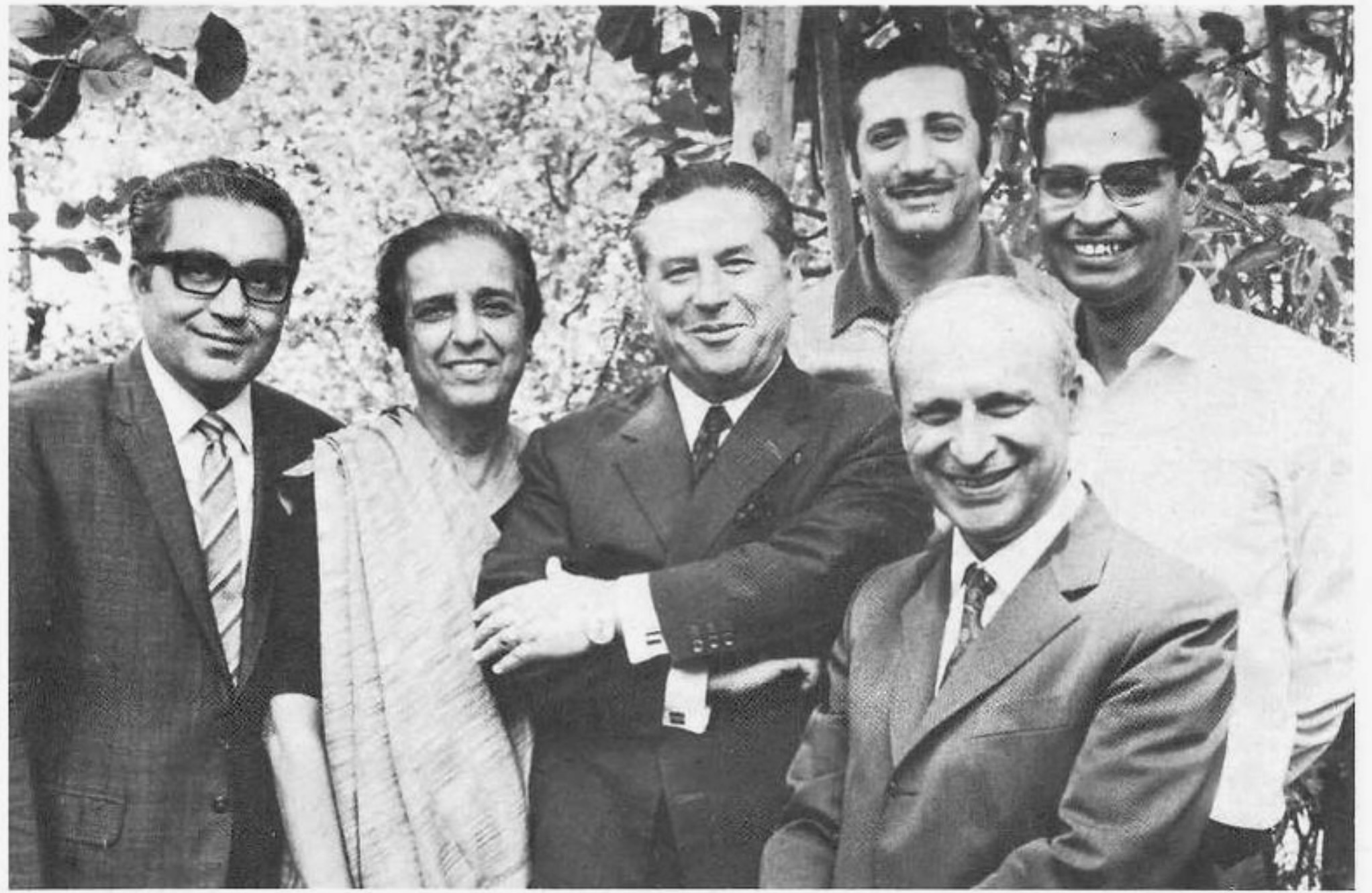
The Continental Board of Counselors for Western Asia, 1970. Front row L-R: Dr. Iraj Ayman, Mrs. Shirin Boman, Mr. Hadi Rahmani, Dr. Masih Farhangi. Back row L-R: Dr Manuchihr Salmanpur, Mr. Vasudevan Sankaran Nair.
HAPPIEST MOMENT
By Vasu’s own accounts, the happiest moment in his entire Bahá’í life was when he went to the holy places in Iran following the meeting of the Board of Counsellors for West Asia Counsellors held in Teheran at the end of July 1968. After that meeting, the Board of Counsellors for West Asia and the National Spiritual Assembly of Iran suggested to Vasu to visit some holy places in Iran. That paved the way for him to visit the House of the Báb in Shiraz and the historical places in that city. It was a coincidence that Mr. Firaydun Mithaq who was an Iranian pioneer to Laos from 1962 was visiting Teheran at the same time. They had met in Malaysia during the summer school in Malacca in 1965 and had undertaken teaching trips after that summer school. They teamed up and went to Shiraz where they were guests in the Bahá’í Centre. They visited the House of the Báb a few times and the holy and historical places associated with the Báb in Shiraz, including the Masjid-i-Vakil where the Báb spoke from the pulpit and the market place where the uncle of the Báb had a shop and where the Báb had worked. Vasu wanted to take a bath in the same public bath that the blessed Báb had been to get a feel of it. Since that original public bath was already in ruins, they went to a similar public bath on the outskirts of the city. Next, they took a bus to Isfahan and stayed as guests in the Bahá’í Centre there. In Isfahan, they visited the resting places of the King and Beloved of Martyrs and the house of Manuchihr Khan, the Mu’tamidu’d-Dawlih, the Governor of Isfahan as well as other holy places. Throughout these visits, Vasu was silent and in deep meditation and shed tears on many occasions. On 5 August 1968, Vasu flew from Tehran to India through Mumbai city.
VAST RANGE OF ACTIVITIES
As a Counsellor, Vasu was invited to many activities. Although tired and worn out with lots of work most of the time, he always found ways to oblige. The number of gatherings Vasu attended are far too many to be listed here. Nevertheless, some key gatherings will be mentioned.
When a Winter School was held at Gwalior, from 11 to 15 October 1968 with the theme of “Universal Participation”, Counsellor Vasu participated and spoke, along with Hand of the Cause of God Mr. Enoch Olinga.
Sri Lanka was very much under his jurisdiction. Counsellor Vasu made a trip to Ceylon on 19 February 1969 and entered as follows in the visitor’s book: “It is with a heartful of joy and gratitude that in Ceylon and its wonderful Bahá’ís – the joy of having been together, the sharing of problems, the excitement of the meetings, and just being happy with each other – has given strength and built up our community-feeling. May the love of Bahá’u’lláh and service in His Cause intoxicate us and makes us the waves of one sea. May my loving thoughts and prayers reach every one of you.” At the request of the National Spiritual Assembly of Sri Lanka, in 1970, Counsellor Vasu visited Batticaloa District in Sri Lanka. In 1969, an Administrative Committee for Ceylon was appointed by the Hand of the Cause of God Mr. Collis Featherstone on which Counsellor Vasu was acting on behalf of the Universal House of Justice. This Committee was responsible for the affairs of the Faith on the island until the Convention in 1972.
Back in South India new inroads were created. In June 1969, Mr. Kannaiyah Adaikkalam of Alor Star arrived in Coimbatore. Kannaiyah joined the young Assembly of Coimbatore and Sabapathy in organising a Teaching Conference in Coimbatore in August 1969. The Conference was attended by many friends from Mysore, Madras, Salem, Connoor, and Kerala and was graced by the presence of Counsellor Vasu, along with Dr. Bhargava, Chairman of the National Spiritual Assembly of India. The conference received good publicity for the Cause and appreciation from the Supreme Body. The conference took place at a time when the Faith had not emerged out of obscurity in Tamil Nadu. Later Vasu, Kannaiyah and Sabapathy visited the Arts College in Coombatore for teaching and a couple of the students accepted the Faith.
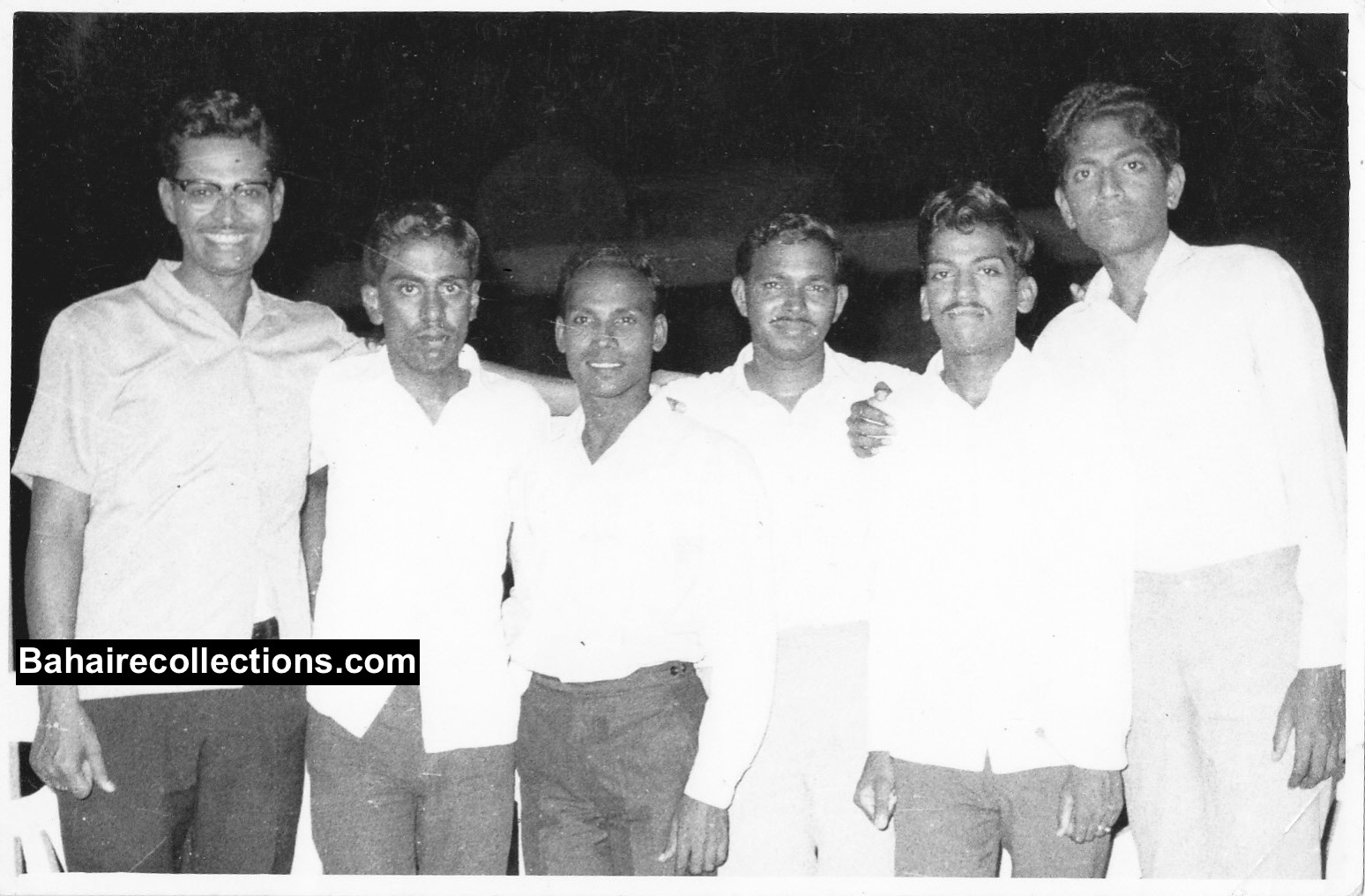 Arts College, Coimbatore. Vasu at the extreme left, Kanniah Adaikkalam third from left and Sabapathy, fourth from left. The others are new believers.
Arts College, Coimbatore. Vasu at the extreme left, Kanniah Adaikkalam third from left and Sabapathy, fourth from left. The others are new believers.
MARRIAGE
The next important phase in the life of Vasu was his marriage. When the proposal was there for him to get married to Miss Sitara Boman, daughter of fellow Counsellor Shirin Boman, Vasu was still a full-time pioneer. He confided in her that he had nothing much in his pocket. Miss Sitara accepted him for what he was. The families of both sides gave their fullest blessings. Dr. Muhájir who was overjoyed with this union sent two gold rings for them to be used for their engagement. A simple engagement took place and the wedding itself took place on 2 May 1970, in Gwalior city, India where about 600 non-Bahá’ís attended. At this wedding some 1,000 copies of the Bahá’í Marriage Tablet of ‘Abdu’l-Bahá were distributed. Since there was nobody from the family of Vasu at the wedding, Auxiliary Board member Mr. Mobedzadeh stepped in to represent his family. Thus, Vasu was married into one of the most illustrious Bahá’í families of India. Sitara became the strongest companion, shield and strength for Vasu, with which he was able to move more effectively in the Cause.
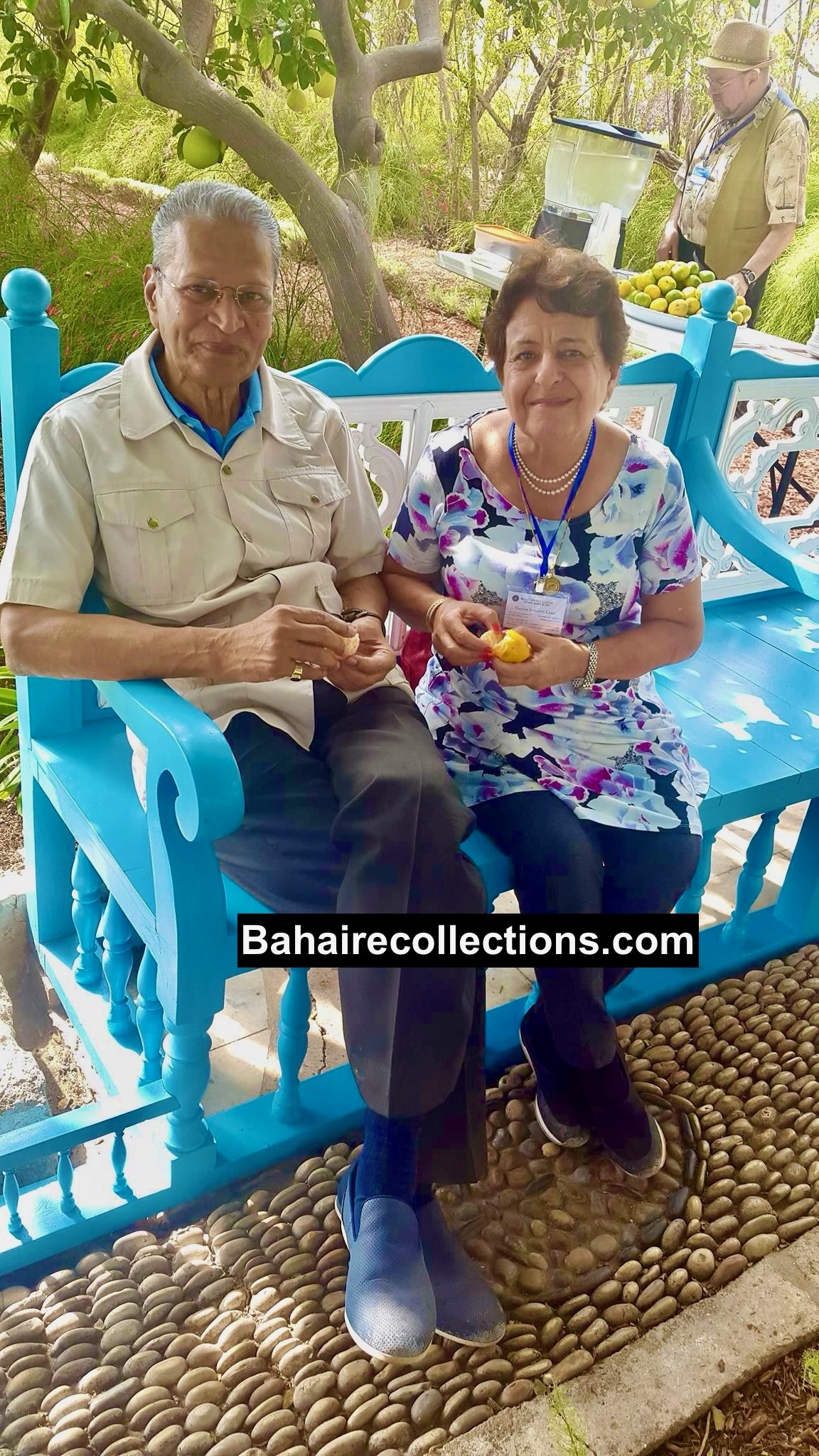
Pilgrimage to the Holy Land in 2016
COMPACT ACTIVITIES
His activities kept on rising as days went by, As it is beyond the scope of this essay to list each of those some important ones will be mentioned. When the West Asian Youth Conference was held in New Delhi from 27 to 30 August 1971, the first of its kind, more than 350 youth from Tran, Pakistan, Ceylon, Malaysia, Nepal, Sikkim, Bhutan, Arabia, Turkey, Burma, Afghanistan and India participated in the Conference. Counsellor Vasu read out the message from the Supreme Body which read, “We send our heartfelt greetings to all the young champions of Bahá’u’lláh who have assembled in New Delhi on this auspicious occasion. You have met to consider what you can do to give further impetus to the great youth movement presently flourishing throughout the Bahá’í world”. He also addressed on the topic of “New Dimension of Teaching”. Dr. Muhájir who was also present here urged the youth to remember this conference for years to come and reminded them that ‘Abdu’l-Bahá had given the important duty of teaching the Faith to youth, and that in a few years it would be the youth who will organize the teaching work all over the world.
Counsellor Vasu was one of the speakers at the Winter School held in Mala’s Hotel in Panchgani from 25 to 30 December 1971. Several youths who attended this Winter School returned having deepened their knowledge of the Faith.
On 9 February 1972, Counsellor Vasu conducted a seminar which was attended by over a hundred newly enrolled students, at the Bahá’í House in New Delhi. Hand of the Cause Mr. Abu’l-Qásim Faizí too addressed the seminar participants. On 7 May 1972, a successful Fourth National Youth Conference was inaugurated in Pune city by Hand of the Cause Mr. ‘Alí-Akbar Furútan. Counsellor Vasu gave much assistance to the success of this historical conference that was participated by forty-five delegates from twenty-five youth centers.
In the same month of May 1972, Counsellor Vasu attended the Forty Third Annual National Convention of India in Pune, with the Hand of the Cause of God Mr. ʻAlí-Akbar Furútan gracing the occasion.
VASUDEVAN IN AFRICA
Yet one more area of service where Dr. Muhájir had used the services of Counsellor Vasu was in assisting some African countries in 1972 to fulfil the remaining goals of the Nine-Year Plan assigned to them. Dr. Muhájir uprooted pioneers from Iran, India, Malaysia, and the Philippines to go to Africa. What was needed was a dynamic person to guide and lead them. The natural choice was Counsellor Vasu. In June 1972 Vasu was attending Counsellor’s meeting in Teheran and Dr. Muhájir arrived there with his grand project for Africa that was approved by the Supreme Body. Dr. Muhájir met Vasu, explained the urgency of the situation, and urged him to go to Kenya immediately through the Holy Land. Vasu immediately consented, all to bring joy and happiness to the Supreme Body and to please Dr. Muhájir. At that time his wife Sitara was expecting their second child. Given the urgency of the situation, Vasu sent a note to Sitara through his fellow Counsellor and mother-in-law Mrs. Shirin Boman, informing her of the pressing need to proceed straight from Iran to Africa. Vasu then flew from Iran to the Holy Land where he met the Supreme Body. Mr. Amoz Gibson, a member of the Universal House of Justice, produced out of his pocket a vial of rose attar from the Shrines to anoint the African believers. Mr. Hushmand Fatheazam, another member of the Supreme Body drove him to the Tel Aviv airport in the evening. Vasu arrived in Nairobi on 9 June, ahead of the other travel teachers from the other four countries. He was there as a field worker himself and coordinated the teaching activities along with fellow Counsellors Aziz Yazdi and Continental Teaching Committee member Mr. Hassan Sabri.
While in Africa he visited Kenya, Uganda, Swaziland, and Tanzania, at times visiting the same county a few times. Vasu himself set a personal example of loving cooperation with the believers. His main task, hectic though was to move among the masses and get the friends and communities to teach among the villages and towns. The very day Vasu arrived in Nairobi, he attended a teaching conference. The next day he proceeded to Mombasa and delivered a talk at a teachers’ college where about 200 trainees gathered. He then went to Kakamega and the Western Province of Kenya. On 14 July he took a bus to Kampala in Uganda and visited the Bahá’í Temple and then went on teaching trips concentrating on high schools. On 18 August he was at the Ioas Teacher Training Institute in Swaziland. It was filled to capacity. Here he met Amatu’l-Bahá and Mrs. Violet Nakhjavani on Saturday, 19 August. They were on an African safari at that time. Amatu’l-Bahá gave every encouragement to those who had gathered to teach the Cause while Vasu gave an inspiring talk on winning the goals for Africa. Vasu was back in Kisumu, Kenya, and participated in the National Youth Conference held in on 26 and 27 August 1972. He then travelled to Tanzania, hoping to create a movement among the pioneers and local believers. Vasu next went to Mauritius for one week. On 1 October 1972 Vasu conducted the first institute for new believers of Mauritius, which was organized by the National Teaching Committee. More than fifty friends attended the event. From Mauritius he left for India, reaching Mumbai city on 5 October 1972. Though extremely hectic while in Africa, he used to recount that his service in Africa was one of the greatest joys for him.
CONCERN OF DR. MUHÁJIR
While in Kampala, Vasu went for a medical check-up which revealed that he had contracted serious infective hepatitis and was advised immediate rest and treatment. After about ten days the Rosts with whom he was staying in Uganda took him to Nairobi and was placed under the care of an American pioneer couple at Egerton College. He was knocked off for some three weeks. Dr. Muhájir who heard of Vasu’s ailment quickly sent a telegram that he should be given a certain injection. Dr. Maakuti, a pioneer who lived in the town immediately administered that injection and Vasu recovered quickly. Dr. Muhájir was happy to learn of his quick recovery. Vasu was simply too precious for Dr. Muhájir.
DOCTORATE
While Vasu was a full time Counsellor for India and Sri Lanka he was appointed for second term as a Counsellor for South Central Asia in May 1973. As Vasu who was already a husband and father with his own family, he felt it was a vital necessity to be self-supporting financially. He decided to pursue his higher studies and wrote to the Supreme Body. That infallible body gave its fullest blessings for him to proceed. With that he left for the University of Massachusetts at Amherst in the United States together with his wife Sitara and their two children, Vivek and Jaya in quest of a post-graduate degree. It was Dr. Dwight Allen, the Dean of the College of Education at that university who encouraged Vasu to take up a doctorate and also offered him admission. He went to the University in August 1973. Since Vasu was out of the country, on 30 September 1973 he was relieved of his responsibility as Counsellor for South Central Asia.
While in the United States he was actively involved in local activities. Vasu was a speaker at the Winter School held at the Green Acre Bahá’í School from 26 to 31 December 1973 where he addressed with authority on the growth of the Faith in India and Malaysia. When the International Goals Committee of the USA organized an institute at a home of a local believer in Massachusetts from June 25 June to 2 July 1974 to dispatch travel teachers to India, Vasu spoke in unmistakable language on the topic of “Covenant and the World Order of Bahá’u’lláh” and gave an outline of the history of the Faith in India, its present situation and its prospects under the Five Year Plan. At the Bahá’í School held from 14 to 20 July 1974 in Green Acre, Vasu spoke on the topic of “From Hinduism to the world Order of Bahá’u’lláh”. While in the United States he served in such a way that his studies were not affected, and he studied in such a way that services for the Faith were not affected.
RETURN TO INDIA
In 1977 Dr. Vasudevan went from the United States to Bangkok, Thailand for eight months to complete his doctorate thesis there. From Bangkok Dr. Vasu returned to his old haunts of India with a doctoral degree in education. Dr. Muhájir, on learning that Dr. Vasu had returned to South India was very happy. There was a phone call from Dr. Muhájir who was in some other part of the world. In that phone call, Dr. Muhájir said, “Welcome to South India”. Dr. Muhájir of course had a plan for Dr. Vasu. Learning that Dr. Vasu had returned to India, the Counsellors appointed him Auxiliary Board member for South India. Dr. Vasu gladly accepted this appointment, as another avenue to serve the Cause in yet one more capacity.
PROJECT MANAGER
One of the most ambitious projects launched by Hand of the Cause of God Dr. Muhájir was the South India Teaching Project of 1977, a twinning project between the national institutions of Malaysia and India. To boost the spirit of the workers under this Project, a South India Teaching Conference was held in Bangalore from 22 to 24 January 1978. Here Auxiliary Board member Dr. Vasu made a passionate appeal to the believers gathered to double the number of believers in South India during the remaining months of the Project as a gift to the Universal House of Justice. The South India Teaching Project was such a resounding success that a similar project called the East India Teaching Project was initiated in Calcutta area with Dr. Vasu as the Project Coordinator. This project revived the Bahá’í communities of smaller states of Manipur, Meghalaya, Tripura, Nagaland and West Bengal itself. In the last visit of Dr. Muhájir to India he called Dr. Vasu to serve as Secretary to the National Teaching Committee with the approval of the national institution. With that appointment, Dr. Vasu settled in New Delhi to perform the tasks of Secretary of the National Teaching Committee. Most unexpectedly Dr. Muhájir passed away in December 1979 and Dr. Vasu was devastated and truly shattered. The passing of Dr. Muhájir in the words of Dr. Vasu was, “The saddest and most devastating moment in my life”. His wife Sitara would always say, “Dr. Muhájir was everything for my husband.”
Then came the North India Teaching Project in 1980 for which the goal set by the Universal House of Justice was electing 300 Local Spiritual Assemblies by Riḍván 1981. Dr. Vasu, as Secretary of the National Teaching Committee gave his fullest support.
At a Naw-Rúz celebration organised at Lucknow in 1980, some 300 residents attended, among whom 100 embraced the Cause. A follow-up program was organised at Lucknow’s Clark Hotel which was opened by the Hon. Mr. Justice M. H. Beg, former Chief Justice of India. Dr. Vasu as Secretary of the National Teaching Committee was one of the speakers. Dr. Vasu also was a regular speaker at several courses organised at the Bahá’í Youth Academy in Panchgani, India.
In May 1980 Dr. Vasu was one of the speakers who spoke at the centenary celebration of the establishment of the Bahá’í Faith in India, held at the Bahá’í House in New Delhi. Among the top ranking dignitaries present were the Minister for Home, Mr. Giani Zail Singh, and Mr. P.V. Narasimha Rao, Minister for Foreign Affairs and the Honourable M. H. Beg, former Chief Justice of India. Messages from the Prime Minister and the President were read out. The event received wide publicity in the newspapers, radio and television channels.
A NEW ERA AT THE NEW ERA HIGH SCHOOL
Months later in 1981, Dr. Vasu began to receive feelers from Dr. Ray Johnson, Principal of the New Era High School in Panchgani, to take up the post of Vice-Principal of the school, which was established in 1945. In 1982, Dr. Vasu left with his wife Sitara and their three children to serve at the New Era High School. He started as Vice Principal in 1982 and then as Principal until his retirement in 1998. As soon as Dr. Vasu took over the school he developed a new vision for the school to become a new kind of school. Challenges ensued, both from within and without, and the difficulties he endured during this period would have broken any lesser men. He soldiered on with a determined resolve to make the institution among the most distinguished educational bodies in India.
Dr. Vasu’s time at New Era High School drew on the skills he had developed over many years as a school teacher, Counsellor as well as his doctoral qualifications in education and his exceptional skills as an administrator and leader. He was clear-eyed on what had to be done for this educational institution. Dr. Vasu built separate dormitories for boys and girls, developed a separate dining hall for the vegetarian students, developed a huge playing field for games and arranged cricket tournaments. He also built an impressive amphitheatre. He volunteered to teach students in the higher classes, especially English literature subjects for which he always had a strong passion. He organised several musicals such as “Oliver Twist,” “David Copperfield,” and “The Sound of Music”, which were admired and attended by several schools around Panchgani.
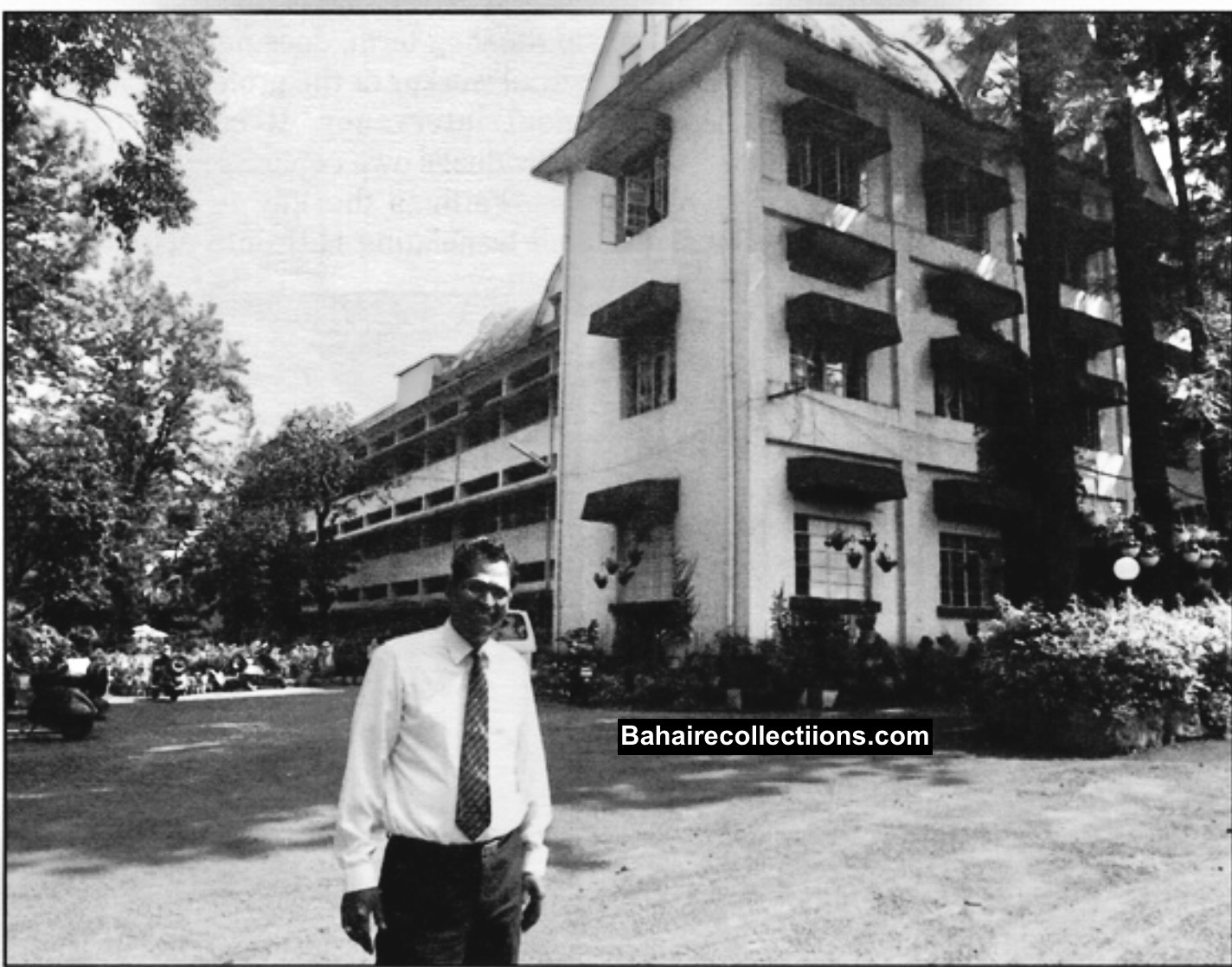
Dr. Vasu as a new Principal at the New Era High School.
Dr. Vasu encouraged the students to excel in their studies for which he introduced the “A” and “O” and the International General Certificate of Secondary Education which is an English language-based secondary qualification similar to the GCSE and is recognised in the United Kingdom. This visionary move in enhancing the academic standards to international levels attracted many students from abroad. While seeking to create excellence in academic standards, Dr. Vasu endeavoured to strengthen the moral classes aimed at developing the character of the students with the hope of contributing to the betterment of the world upon graduating.
He developed excellent public relations and good rapport with the local people and with those in authority, as well as other schools around Panchagani. He was often invited to several of the local functions as a well-respected and admired person.
When Dr. Vasu took over the school, there were some 350 students. When Mr. Hushmand Fatheazam visited the school, he had encouraged the enrolment of students from all over India. By the time he left in 1998, the enrolments had snowballed to more than 1,200 coming from all over India, Iran, and several other countries. Many parents who came to India or elsewhere as pioneers placed their children under the sheltering care of this school for their education and development of Bahá’í character. History has it that the performance of the school and its reputation soared under the tenure of Dr. Vasu, as attested by the former students who are today eminently placed in society. Till today many of them describe Dr. Vasu as the most profound influence in their personal lives, characters and careers – not only as Principal but as a friend, mentor, example, and guide. He was highly successful in creating a “One Family” atmosphere that cemented the hearts of the staff and students. They all to this day owe a debt of immense gratitude to Dr. Vasu for his personal guidance, coaching, and advice. His years there saw the rapid development of the school in terms of enrolment and improvement of physical facilities, creating an environment of excellence. He considered this phase of his services in the New Era High School as “a period of glorious self-forgetfulness”. Thus, his services in the New Era High School itself is a new era in its history.
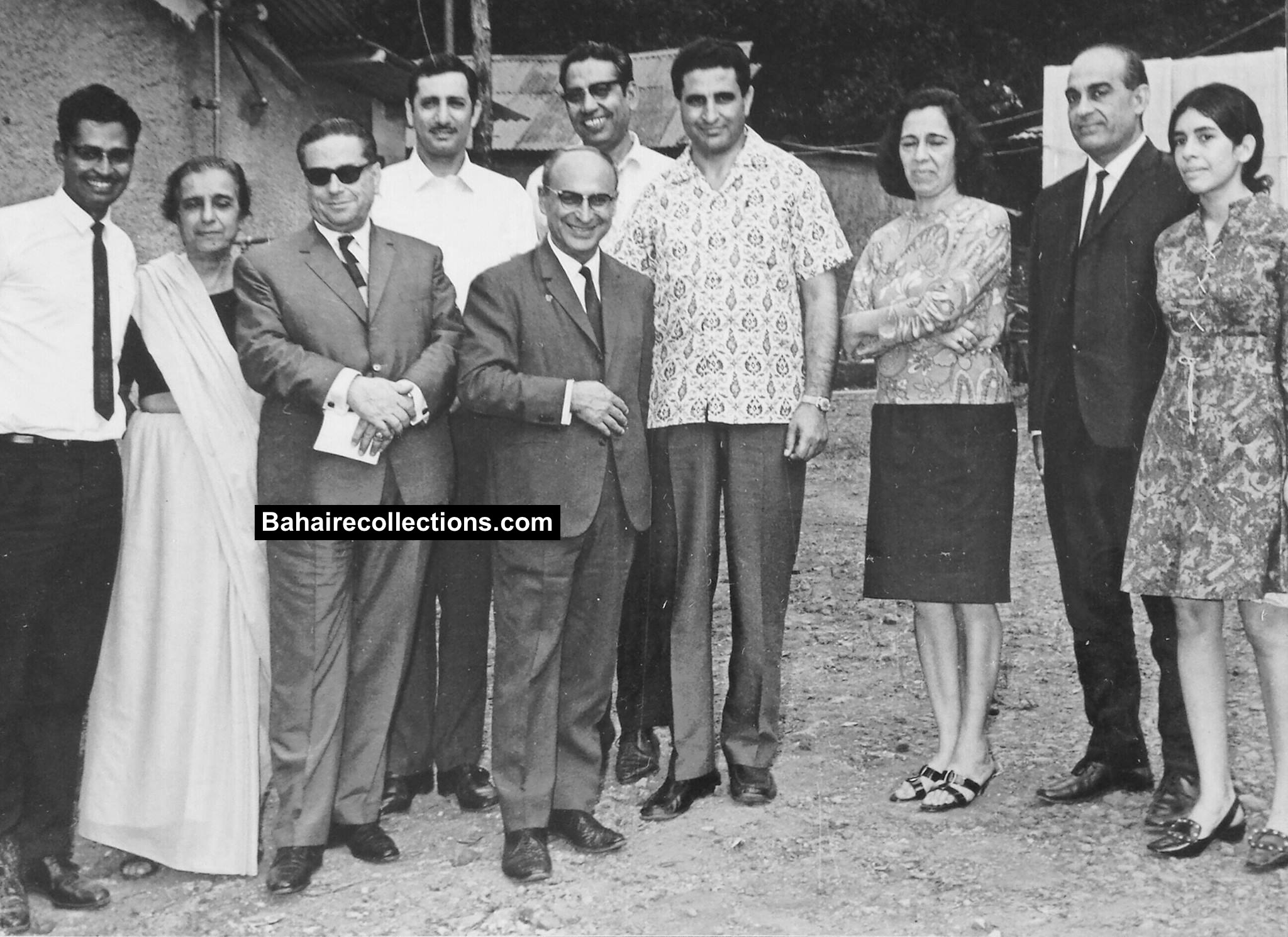
Visit by Mr. Hushmand Fatheazam, member of the Universal House of Justice (centre in short sleeve shirt) during his visit to Panchgani. At the extreme left is Dr. Vasu, with Counselor Mrs. Shirin Boman next to him.
Although Dr. Vasu had retired from the New Era High School in 1998, his heart was very much with the institution and visited the school as and when he could. His last visit to this school in the company of his wife was on 5 August 2023, where he continued to radiate the same spirit, fellowship and love among the students and staff who flocked to welcome him. Taking advantage of their presence in Panchgani the couple visited the Bahá’í Academy and some Bahá’í homes. In all these places they were very warmly welcome with the fondest love.
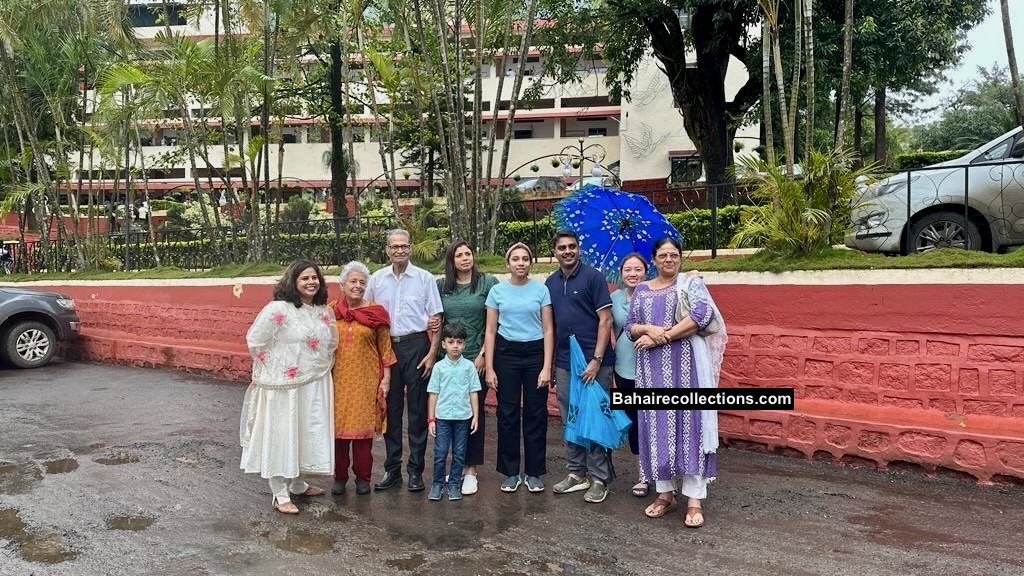
Last visit to the New Era High School with his wife Sitara. At extreme left is Mrs. Suniti Jha, Head of Administration in the School.
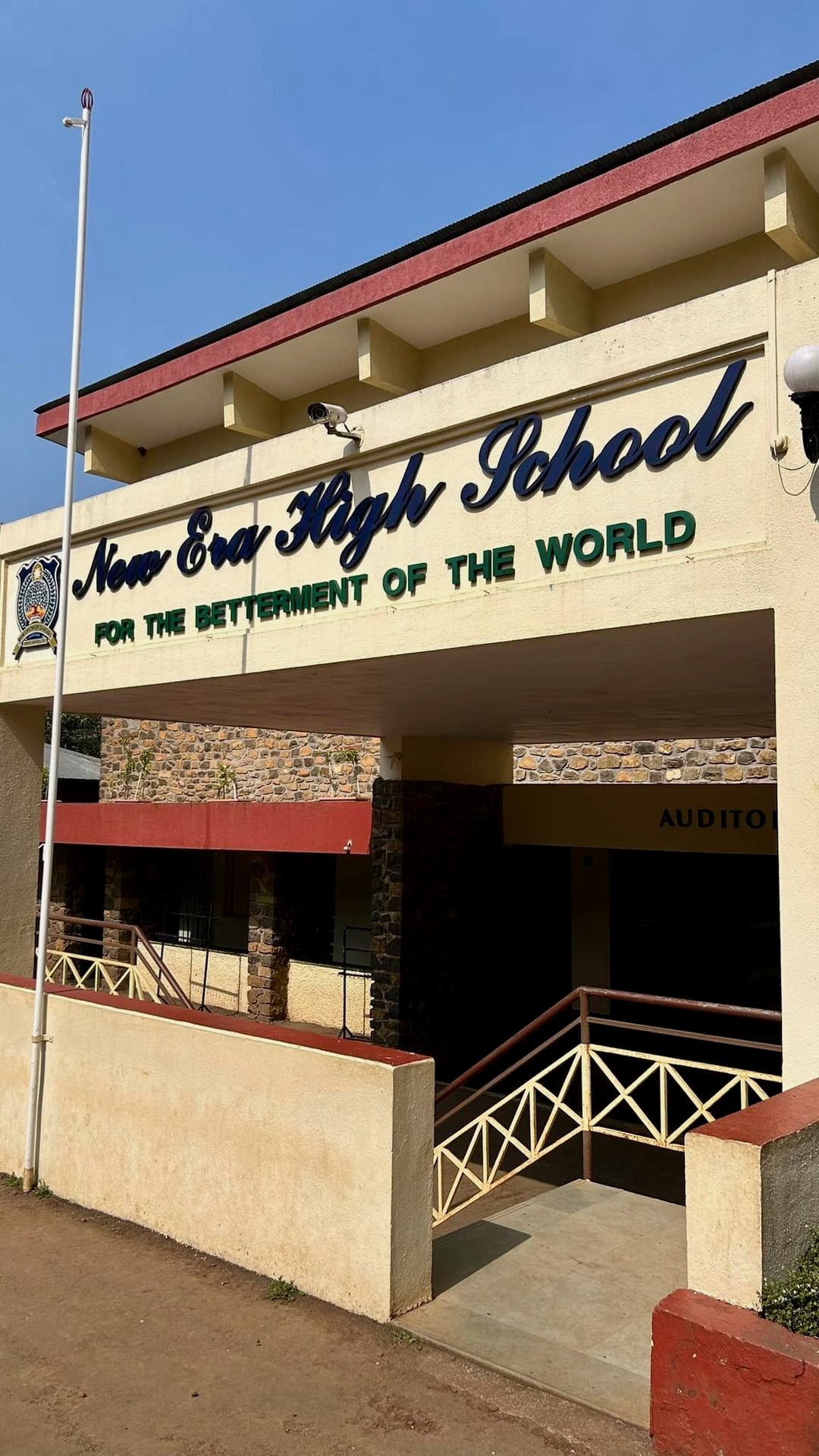
The growth of the New Era High School into a great prestigious institution in later years.
A word has to be said about Dr. Vasu getting actively involved in Bahá’í activities in the midst of attending to the manifold challenges in the New Era High School. He started a series of deepening classes for the Bahá’í students, based on the three volumes of the book “Power of the Covenant” by Hand of the Cause Mr ʻAlí-Akbar Furútan. This was a topic that was very close to his heart. The participants were amazed at the memory power of Dr. Vasu, especially his ability to quote exact dates and years. As a member of the Local Spiritual Assembly of Panchgani, he visited villages and gave deepening classes for them. He was also a member of the State Bahá’í Council of Maharashtra and Goa Regional Bahá’í Council of Maharashtra and Goa during the years 2009 to 2012. When the Bahá’í Academy was founded in June 1982 it first shared the New Era High School premises, until it had its own premises later in Shivaji Nagar. Counsellor Mr. Borhan Afshin came over to this Academy and ran a series of classes. Dr. Vasu too became a supporter of the Academy and gave talks and training. This school also became a venue for large-scale Bahá’í Summer and Winter Schools. More than 115 participants attended the Winter School of 1991 at the New Era High School where Dr. Vasu was a speaker as well.
After retiring from the New Era High School in 1998 Dr. Vasu and his wife were in Seychelles till 2000, involving in Bahá’í activities there. He returned and after some rest, took on as Principal of the RiverDale International School in Pune from April 2003 to November 2004 and then from November 2005 to Febraury 2007. In this institution too he was acclaimed best in terms of its administration and performance. There are far too many students who loved, admired and some even adored him for what the kind of man he was. Here too Dr. Vasu facilitated many activities for the believers.
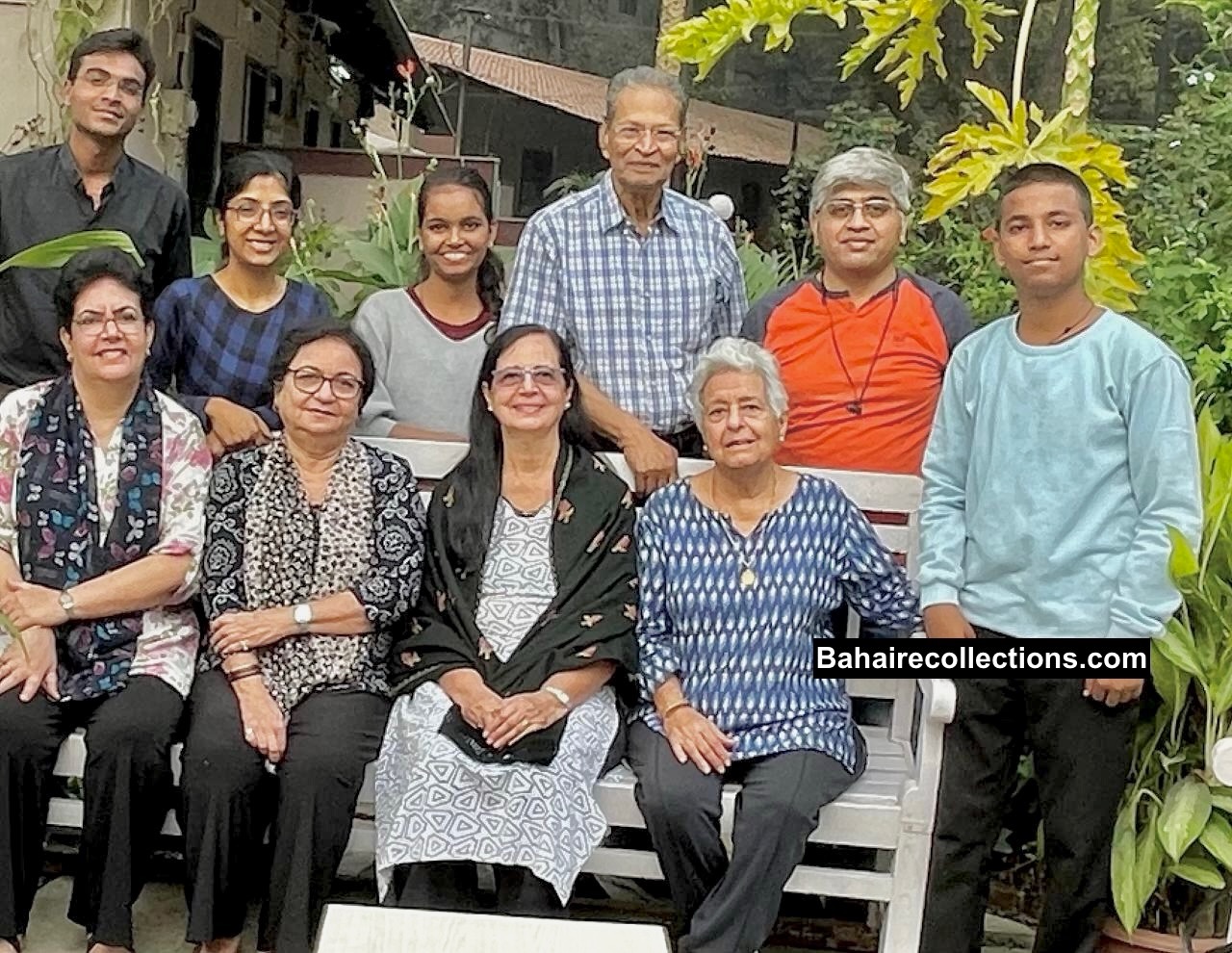
After his retirement Vasu and wife were as active as ever. Seen here is a gathering for Dawn Prayers in Pune.
SOME MEMORABLE TRIPS TO MALAYSIA
While settled in India, Vasu made several trips to Malaysia. Crowds used to rush forth to listen to his riveting talks. A few are mentioned here. The year 1968 when Vasu was appointed Counsellor, the Bahá’ís of Malaysia organized the first Regional Youth Bahá’í Conference in December of that year. On the invitation of fellow Counsellor Dr. Chellie Sundram, Counsellor Vasu participated in this Conference that was graced by the Hand of the Cause of God Mr. Abu’l-Qásim Faizi. Vasu delighted the Malaysian Bahá’ís with glowing tributes and praised their National Spiritual Assembly. He appealed to the Tamil-speaking friends to pioneer to India. The Malaysian believers who had known Vasu were spellbound to see such a new force of dynamism in his talk, while retaining the same humility. After the conference, he accompanied Mr. Abu’l-Qásim Faizi to the well-established Kepis Division of the Jerampadang Estate community in the state of Negeri Sembilan, at the behest of the Hand himself. Vasu translated the talks of Mr. Faizi into the Tamil language.
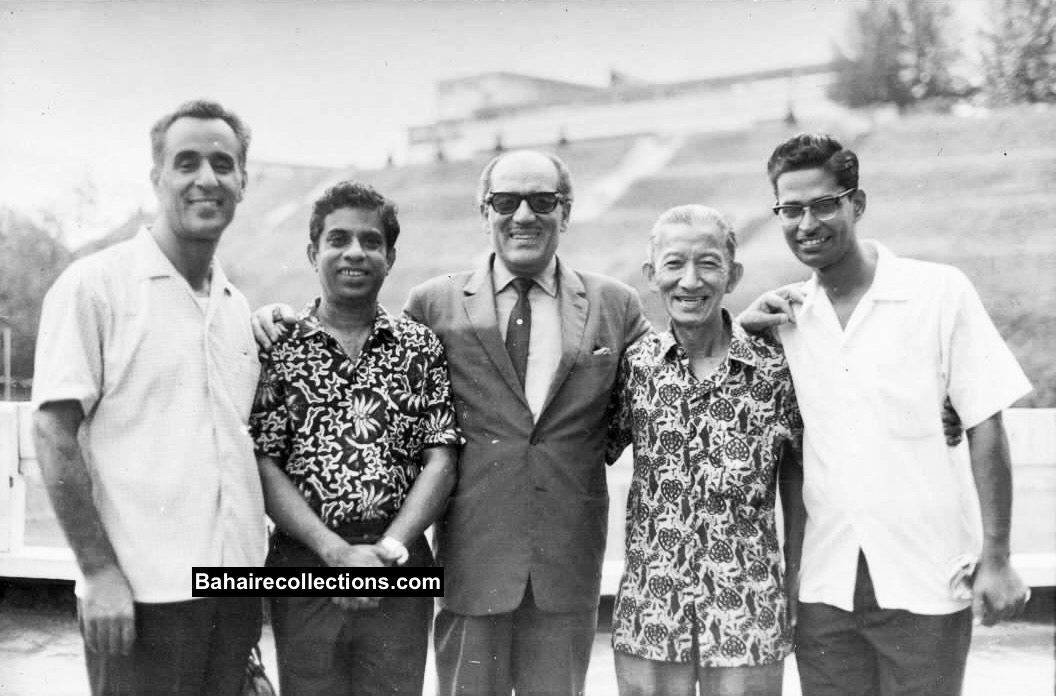
Four Counsellors with Hand of the Cause Mr. Abu’l-Qásim Faizi at the First Regional Bahai Conference held in Kuala Lumpur, Malaysia in December 1968. L-R: Mr. K. H. Payman, Dr. Chellie Sundram, Mr. Abu’l-Qásim Faizi, Yankee Leong and Vasudevan.
In April 1977, Auxiliary Board member Dr. Vasu participated in a conference on ‘Opposition’ held in Port Dickson. The conference was graced by Hand of the Cause Dr. Muhájir. Dr. Vasu spoke eloquently on teaching activities in India. At the Winter School held in Malacca in 1980, Dr. Vasu gave an in-depth talk on the topic of “Bringing Up Children”. On popular demand by the old timers he perfromed the old “Alfanso Flea” to the rocking laughter of the audience! In December 1990, Dr. Vasu participated in a Tamil Winter School at the Yankee Leong Bahá’í Institute in Balakong and witnessed the staging of a stage play on “The Seven Martyrs of Teheran”. That was the first professional stage play in any language in the Malaysian community. At this event Vasu encouraged the Tamil-speaking friends to settle in Tamil Nadu to serve that vast land that needed much more manpower. In all his personal trips too, he had time to meet with friends and communities. In 2005 he was in Malaysia and went visiting communities. He went back to the community of Alor Setar which he first visited in December 1962 and inspired the friends. His last trip to Malaysia was undertaken in the company of his wife, in February 2024 en route to visit his son Vivek in Macau. In this trip he observed that many of those who had accepted the Faith during his time were no more but was consoled that they had left behind their next generation, who were serving the Cause with distinction.
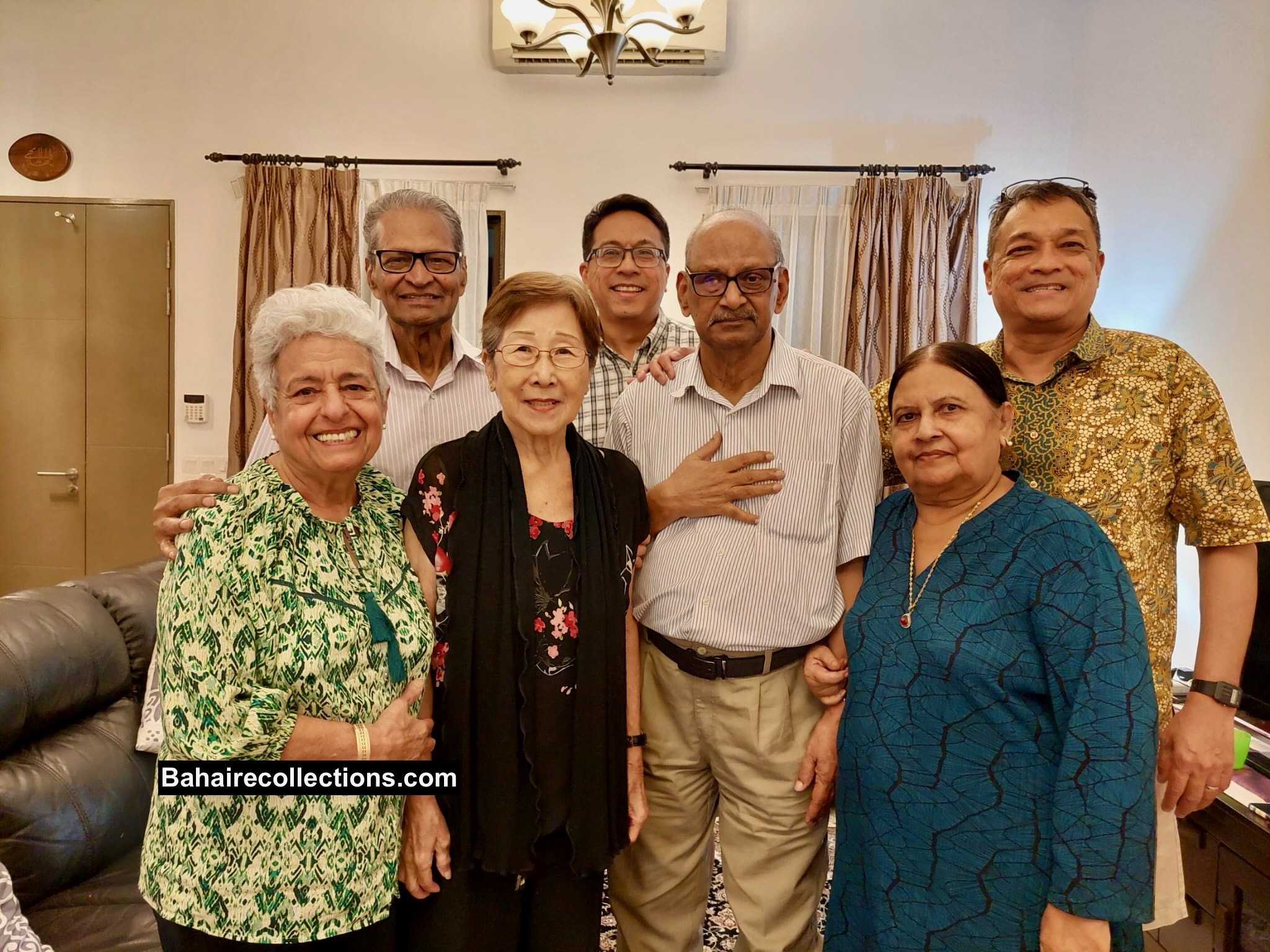
Most recent visit to Malaysia. At the residence of Mr. Theenathayalu in February 2024. L-R: Sitara, Vasu, Lily Chinniah, Soheil Chinnah, S. Bhaskaran, Saro Bhaskaran and Nabil Chinniah.
LAST YEARS
From his retirement from teaching, Dr. Vasu continued his ceaseless service to his very last days. He helped establish a new school near Pune, advised schools elsewhere in the country, and contributed to the discourse on Science, Religion and Development. From May 2003, Dr. Vasu became Principal/Consultant of the Brilliant Stars Education Society in Pune. He also continued to receive ex-students and visitors at his home in Pune and visited his children in Macau and Dubai, inspiring them with his humility, knowledge, kindness, and example. He still found time to give talks in Bahá’í activities. One of the well-remembered events was the Bahá’í Winter School held in Chandigarh in February 2018 where he spoke on Bahá’í solutions to the present day problems of the world around us. In about 2019 he resigned from the Local Spiritual Assembly of Pune, on health grounds.
Dr. Vasu talks on the New World Order. With him is Professor Anil Sarwal.(Video credit: Professor Anil Sarwal)
A RARE KIND OF SERVANT
The fast rise in the Faith of this rare kind of believer was fuelled by a number of factors, chiefly through vast and wide reading of the Writings, and more importantly through his close association with other God-intoxicated servants of his time. He also basked under the love and guidance of several Hands of the Cause of God in Malaysia throughout his life. In Malaysia, he moved closely with Hands Dr. Muhájir, Amatu’l-Bahá Rúḥíyyih Khánum, Mr. Collis Featherstone, Mr. Ṭarázu’lláh Samandarí and Mr. Abu’l-Qásim Faizi. While pioneering in India he continued to associate with Dr. Muhajir, Mr. Faizi, and Amatu’l-Bahá and moved closely with Mr. ʻAlí-Akbar Furútan and Mr. Enoch Olinga apart from attaining the presence of Hands of the Cause of God Dr. ‘Alí-Muḥammad Varqá, and Mr. Shu‘á‘u’lláh ‘Alá’í. These Hands of the Cause of God, according to the Master are “Diffusers of Divine Fragrances”, who are to edify the souls of men, to promote learning, and to improve the character of all men. Vasu was a direct beneficiary of this bounty, a bounty which many in the current generation had not enjoyed, and which the future generations will be deprived forever. His intensive involvement in activities all his life, with no rest itself, was a boost to his spirit. Thus Vasu was a believer of a rare kind. How could it be otherwise for a man who has had such rare exposure? How could it ever be otherwise for one who was nurtured and trained by none other than Hand of the Cause of God Dr. Muhajir?
HIS PASSING AND LEGACY
He was spending his last days immersed in reading Bahá’í books. His precious soul winged its flight to the Abhá Kingdom on 25 June 2024, owing to heart complications, plunging all who knew him into the greatest sorrow. Numerous institutions and individuals were moved to send their condolences to the family on the passing of this ‘Star Servant’ of the Cause. The Universal House of Justice, the International Teaching Centre, and the National Spiritual Assemblies of Malaysia and India sent condolence messages to the family–placed glowing accolades upon him, and assured prayers for the progress of his precious soul. The Universal House of Justice and the International Teaching Centre assured prayers at the Holy Shrines. On the request of the Supreme Body, the national institution of India organised, through the Local Spiritual Assembly of Delhi and the Temple Committee a befitting memorial service at the Bahá’í House of Worship in New Delhi on the evening of 24 July 2024. The New Era High School was closed for half the day on 26 June as a mark of respect for the services of Dr. Vasu as its Principal for seventeen years. A memorial meeting was organised on the evening of 11 July 2024 in the main auditorium of New Era High School to honour the indelible memory of Dr. Vasu.
With his passing, such a splendid record of service, rendered within a span of sixty-three years came to an end. He had remained resolute in his pursuit of service from the time he embraced this glorious Cause. Dr. Vasu has done in life more than what an average believer would have achieved.
Dr. Vasu’s life was complete– a life that was well lived as a believer who made Bahá’u’lláh the centre of his own life. His three children Vivek, Jaya, and Jyoti are today serving the Cause most energetically and effectively in three vastly different countries of Macau, United Arab Emirates, and Papua New Guinea respectively. They have made their parents proud. He was an understanding husband, a loving father, and a good grandfather within his family. As for the community of the Greatest Name, Vasu was a fine human gem that could never be easily replaced! He belongs to an era of his own, decorating the pages of history with his immortalised services for the Cause.
Dr. Vasu had one last wish–he wanted to pioneer to Tamil Nadu and took every drop of effort. He also encouraged the writer of this story to do the same and spoke to institutions in India to find ways to bring the writer to settle in India. Somehow this missionary zeal of Dr. Vasu did not materialise.
Reading the story of Dr. Vasu, one would pause to reflect on the multifaceted person he was, full of rare talents. Every observer of insight will readily and certainly concur that he was a good administrator, excellent field worker, eloquent speaker, avid researcher, good organiser, and a visionary–all rolled into what could easily be termed as a master of many talents.
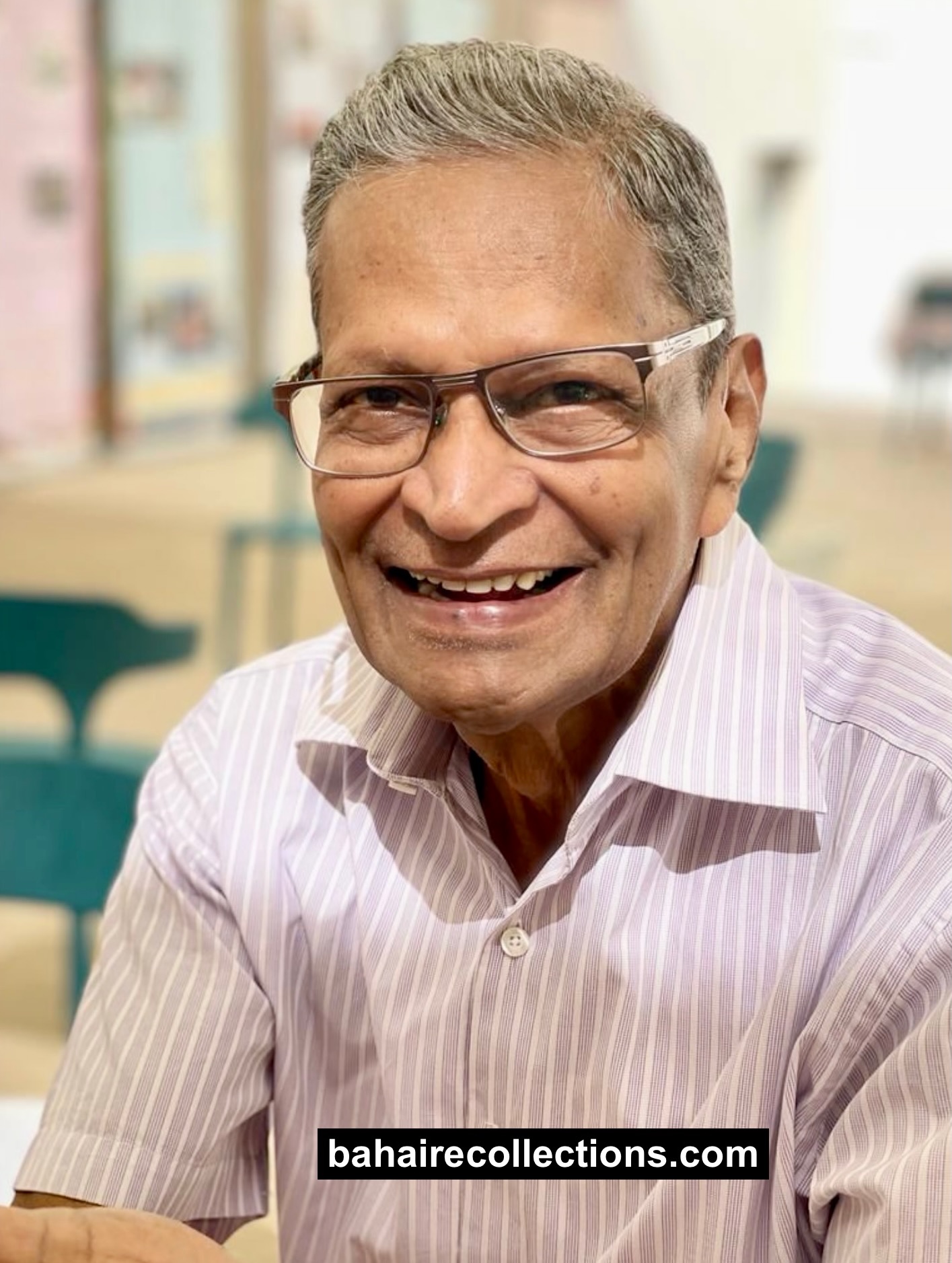
This radiant face and heavenly smile shall forever be etched in the memory of many.
MAN OF THE FINEST HUMAN VIRTUES
No account of Dr. Vasu would be complete without touching upon the finest qualities of this human gem he was. Dr. Vasu was that he was characterised by the finest human virtues.
While in Tehran for a meeting of the Counsellors in 1970 a friend presented Dr. Vasu with the original prayer beads (95 beads) belonging to ‘Abdu’l-Bahá. Dr. Vasu valued that so much and was not ready to barter that with anything. Yet when Dr. Vasu met a believer who was totally shattered in life, he spontaneously gave away those beads to him. That was not quite surprising, as by nature Dr. Vasu had a soft spot for the downtrodden and those unfortunate in life, which he had so strikingly manifested during several phases of his life. It was his nature to be on the lookout to give a helping hand to the needy and take the pains of others upon himself. While in Sri Lanka he gave away whatever he had in his pocket to a believer and flew into Madras (Chennai). He boarded a train from Chennai to Bangalore with no ticket and occupied the upper berth of the train. All along the journey, his only food was a mango. As he was resting someone stole his shoes. He arrived exhausted in Bangalore and the train master who saw his condition took pity on him and did not demand a ticket. From the railway station, he took an auto rickshaw for which the fare was paid by those in Tuba Palace where he stayed. This was the price Dr. Vasu had to pay for showing kindness to someone who deserved all the assistance in Sri Lanka.
He had many challenges in his life. Under all situations, he kept his cool and laid all his affairs in the hands of God. There is not even a single incident of losing his temper, nor incidences of backbiting. Any discussion on individuals was kept at the level of the institution. He saw only the good things in person and encouraged others to do the same. Whenever he was deeply hurt, he lamented in silence and prefered to repair unto His Creator for consolation. He was one of those most forgiving in nature. He was invested with the gift of deep understaning of the Writings. Though a man of vast learning and knowledge on the Faith, he displayed the greatest humility. He never sought prominence, neither was he attached to kingdoms of name and fame. He was always positive in his approach in life. His very company and mere conversation simply enhanced one’s spirit. In all his conversations he would invariably say, “Acha! Very Good! Very Good!” His words were mild as milk and yet had a penetrative influence in the hearts of the listeners. His respect and reverence for elders is something all should learn from. His obedience to institutions was always a lesson to us. His constant advice to the believers was this, “When reading the Writings, always think out of the box and seek the inner meanings.” He was one of those fortunate to have moved with several Hands of the Cause of God, who all, together with the Bahá’í Writings had the greatest impact in his life. He was a balm to the wounded, and one could go to him any time of the day to gain strength and comfort. To him one could confide personal matters in utter trust and confidence. Living the life according to the Teachings was important to him and he never deviated from that. Till his last days, he used to recite the Long Obligatory prayer, though with great difficulties owing to old age. That radiance that emanated from such a wonderful soul created by the wondrous hands of Bahá’u’lláh is no more. Yet that heavenly and radiant smile shall forever flash in the minds of those who had known him.
Seldom have we come across a God-intoxicated servant for whom the Faith was everything. Dr. Vasu was one rare figure who made the Faith proud through the spotless and chaste life that he had led. It is such souls that add meaning to the community of the Most Great Name. Dr. Vasu’s consecrated, relentless, and meritorious services rendered with so much love and utter sincerity were only to please the heart of the Blessed Beauty. His singleness of purpose and unswerving devotion, since the day he accepted the Faith marked him as an outstanding servant of Bahá’u’lláh.
He shall forever be remembered by the current and yet to be born generations as he had truly risen to such heights of service as few indeed could attain. We can be assured that Dr. Vasu’s passing is a tremendous loss to us, and indeed a precious gain to the next world where he is sure to be rewarded abundantly for the kind of dynamic example he had set amongst us.
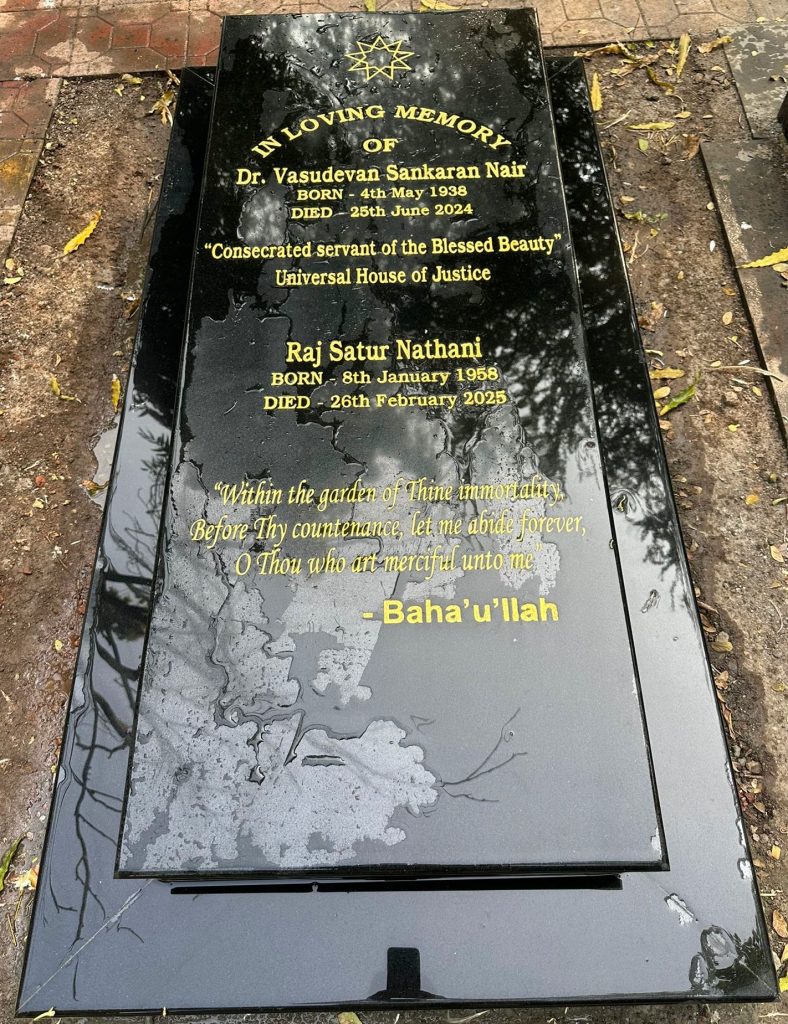
Thy Trust hath been returned unto Thee. It behooveth Thy grace and Thy bounty that have compassed Thy dominions on earth and in heaven, to vouchsafe unto Thy newly welcomed one Thy gifts and Thy bestowals, and the fruits of the tree of Thy grace.- Bahá’u’lláh
A. Manisegaran
31 July 2024
Copyright©bahairecollections.com
You may leave your comments at: info@bahairecollections.com